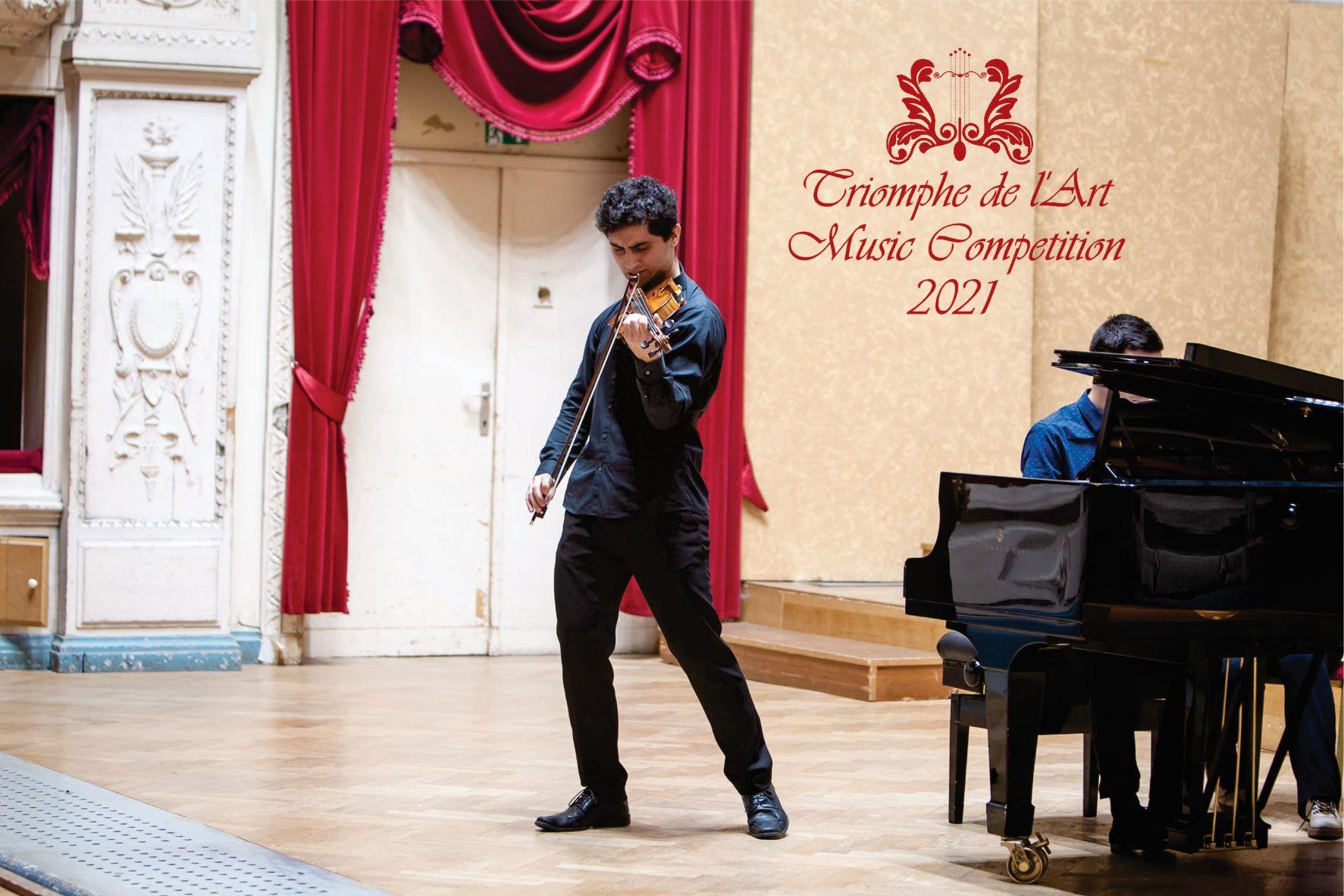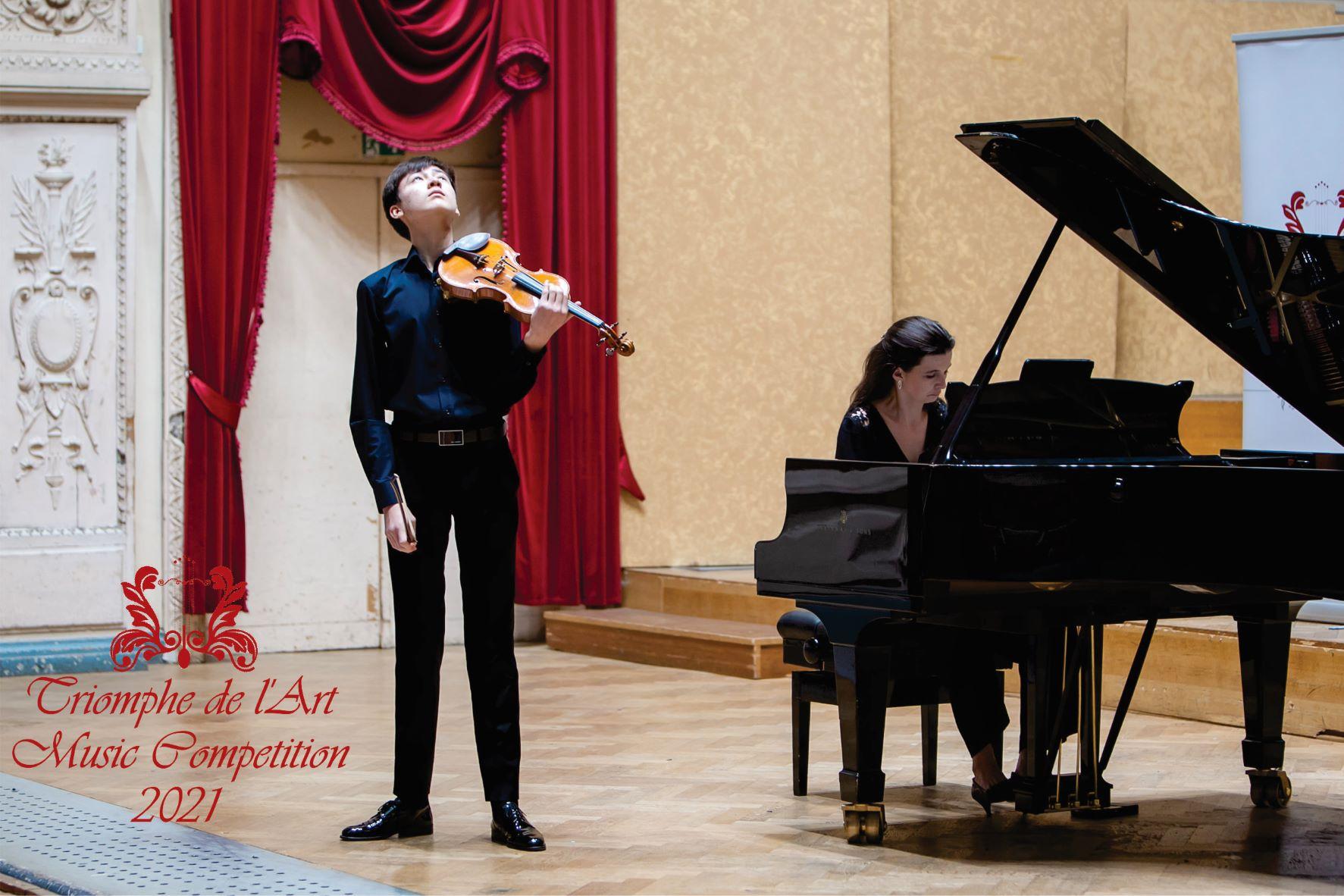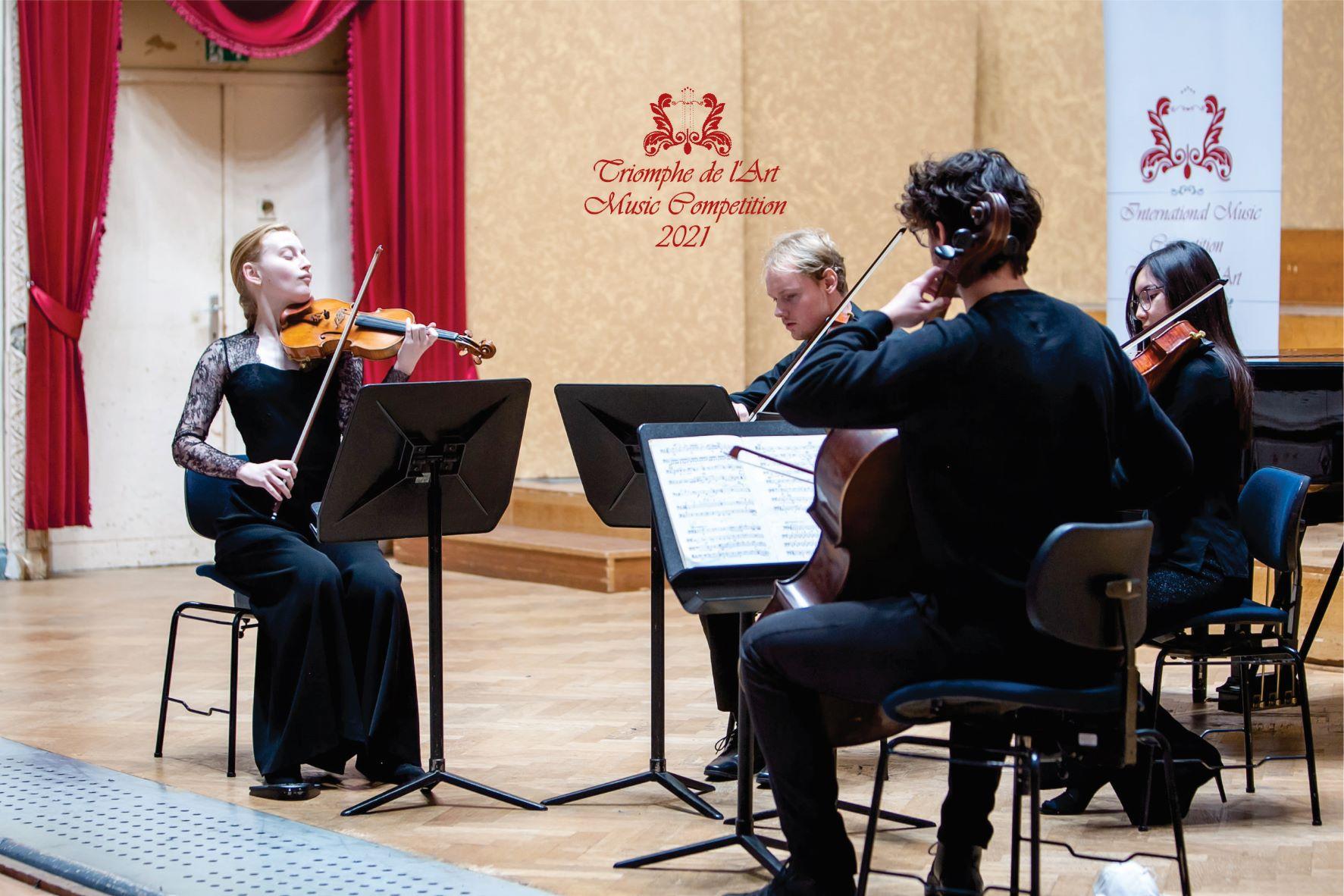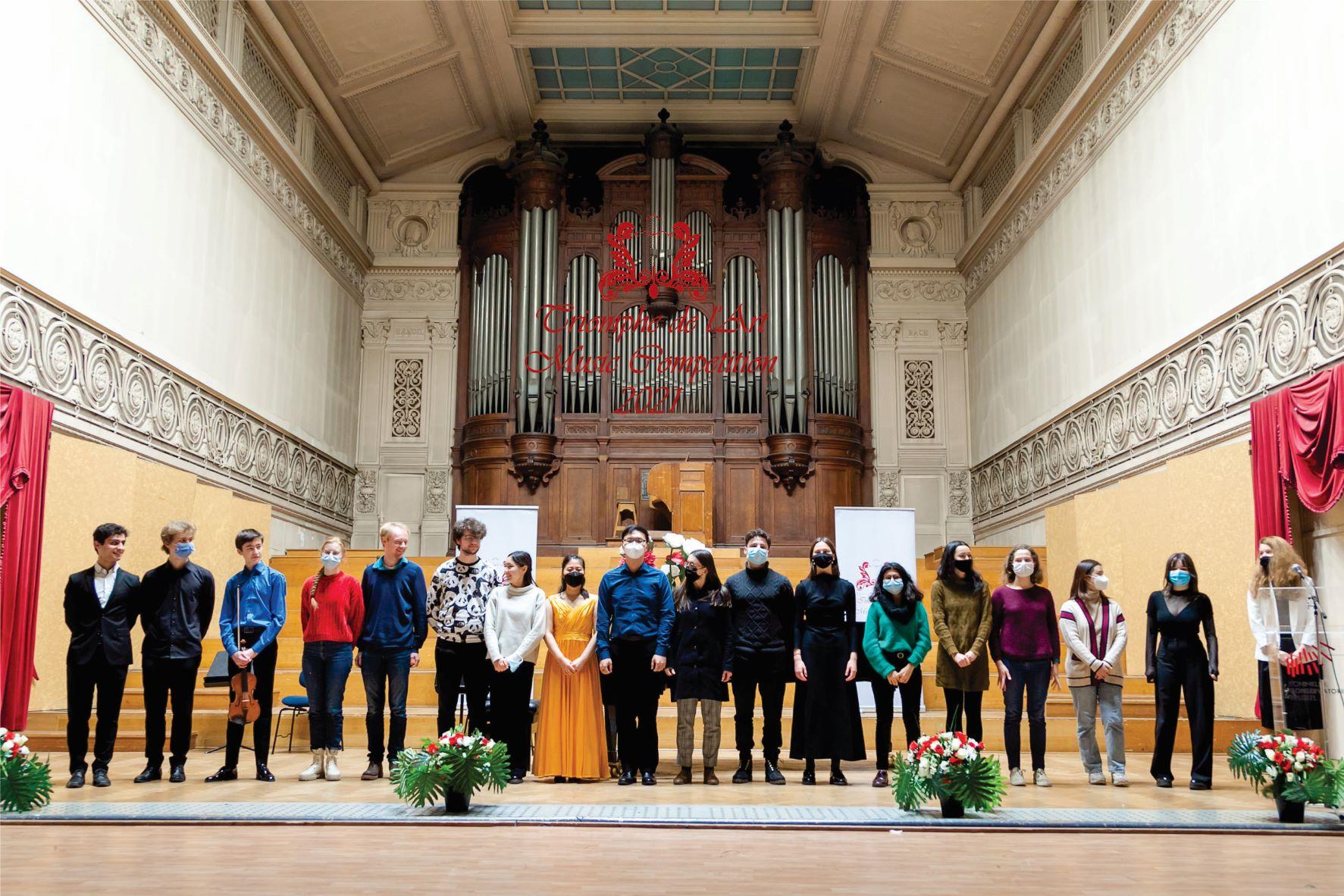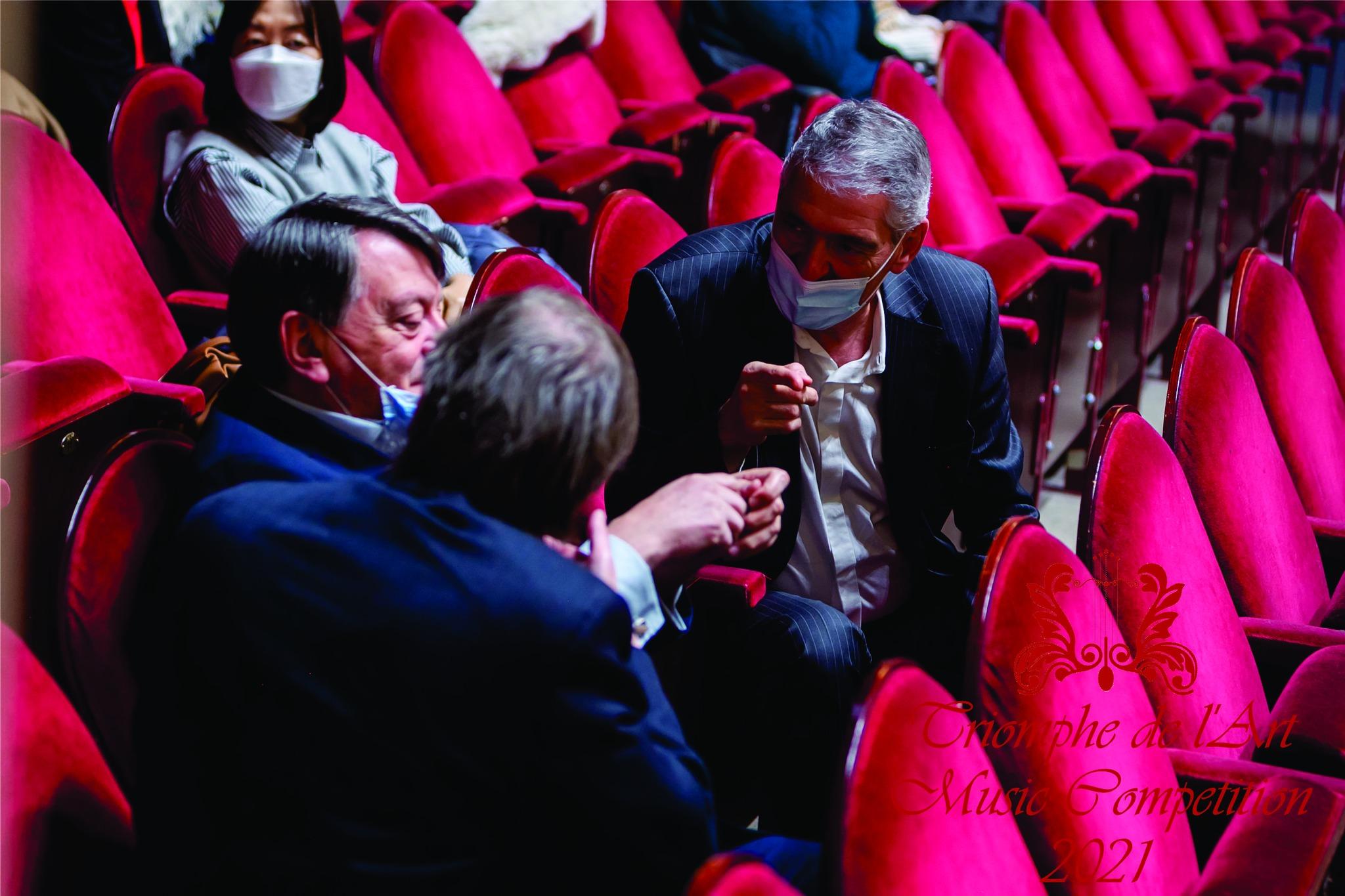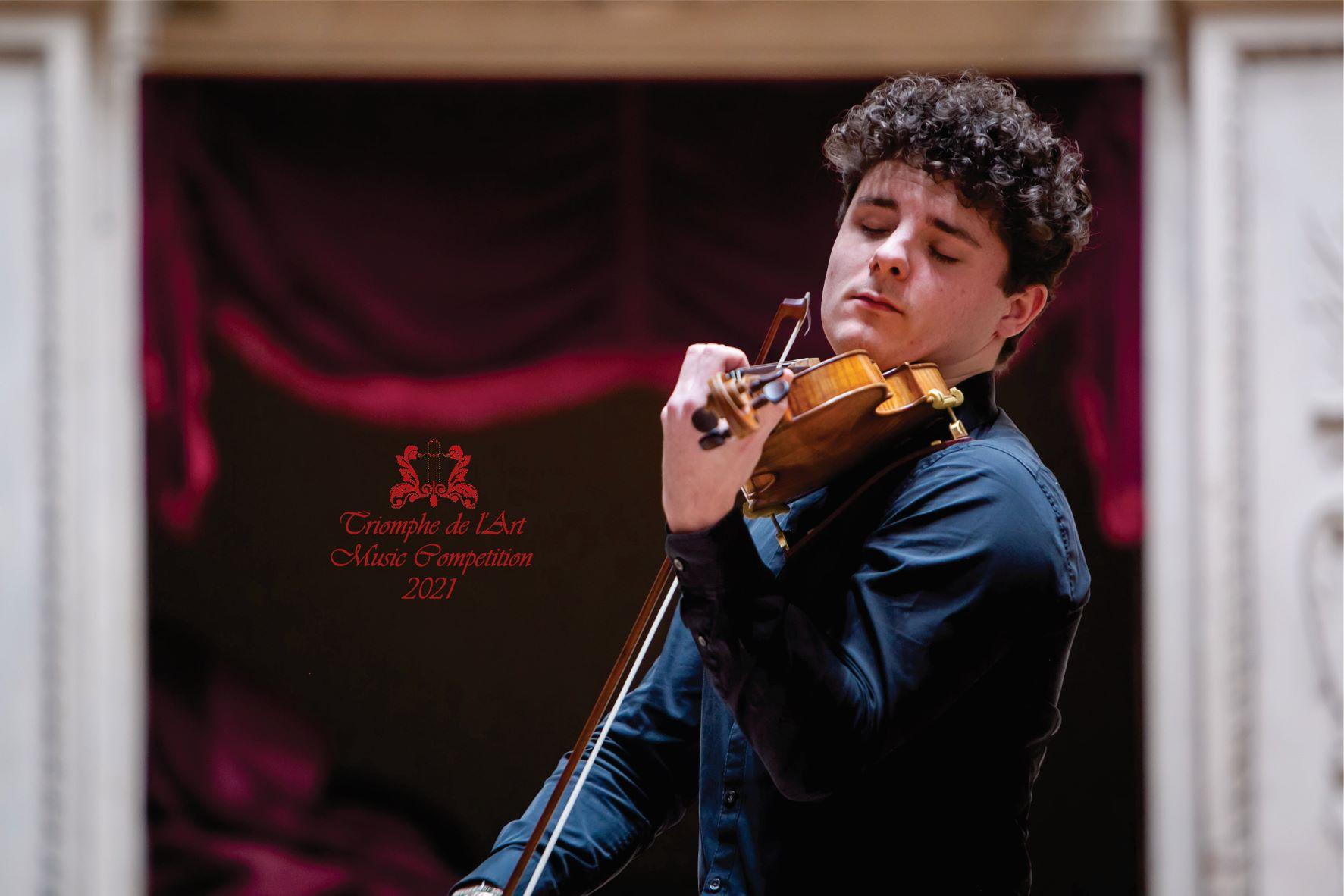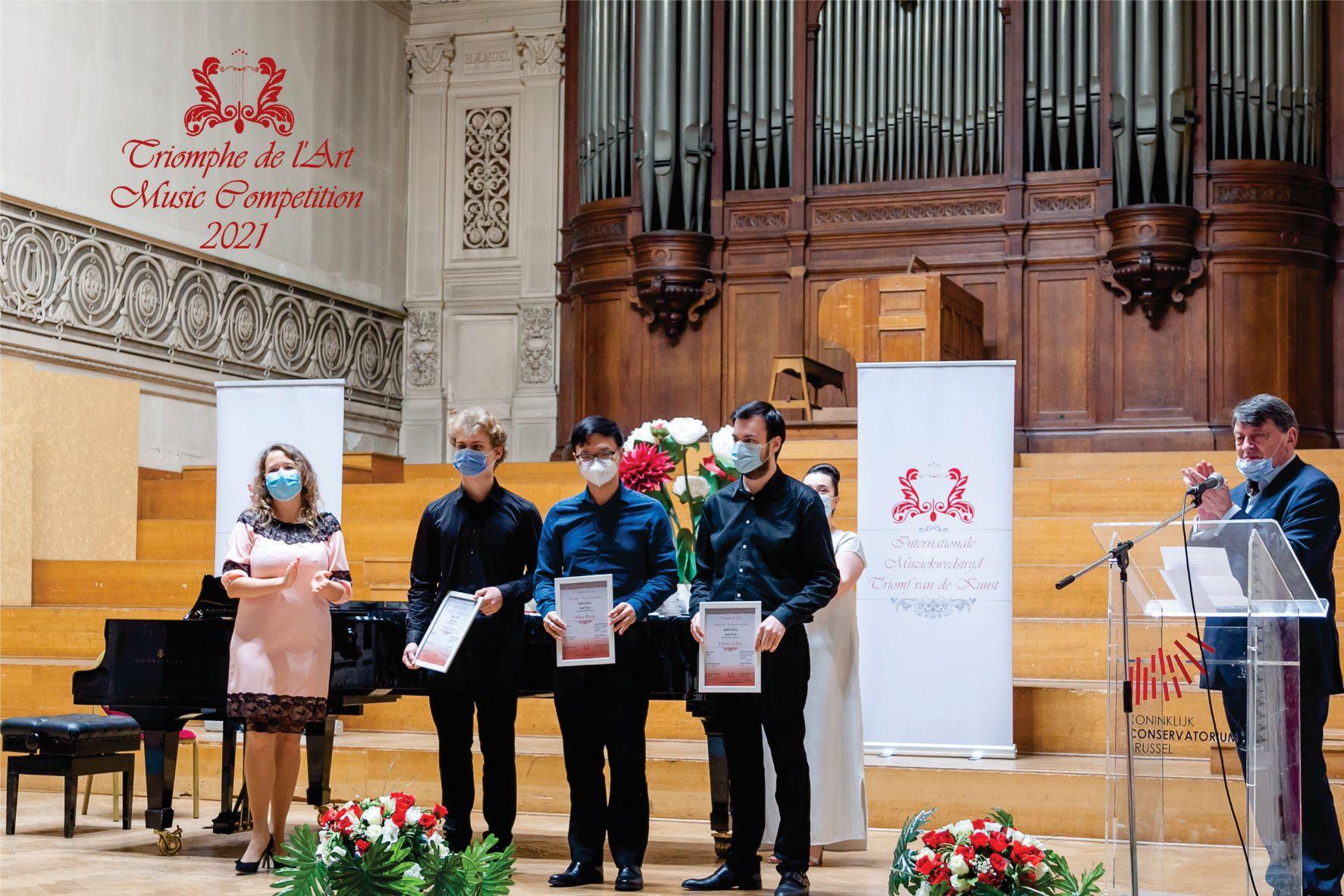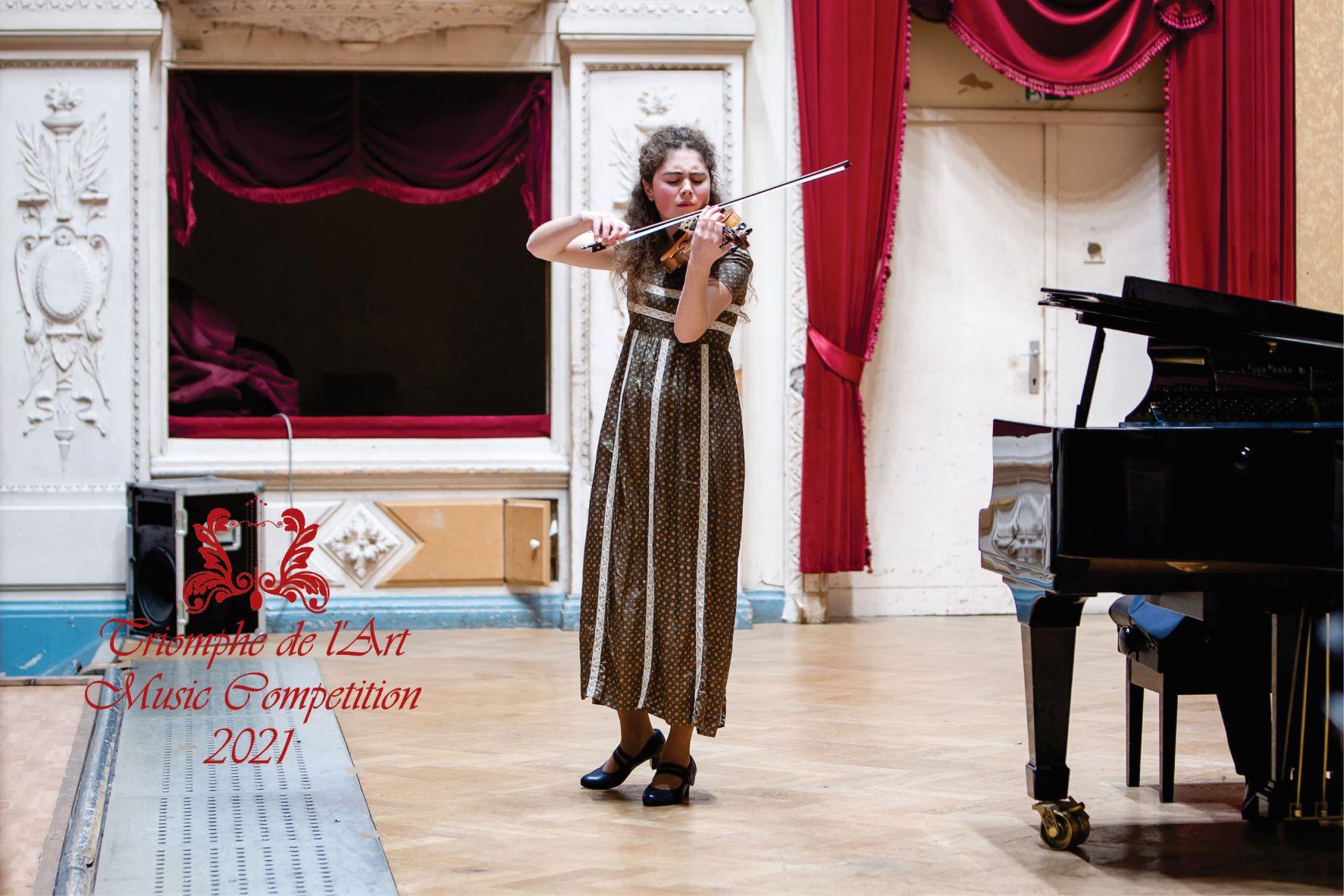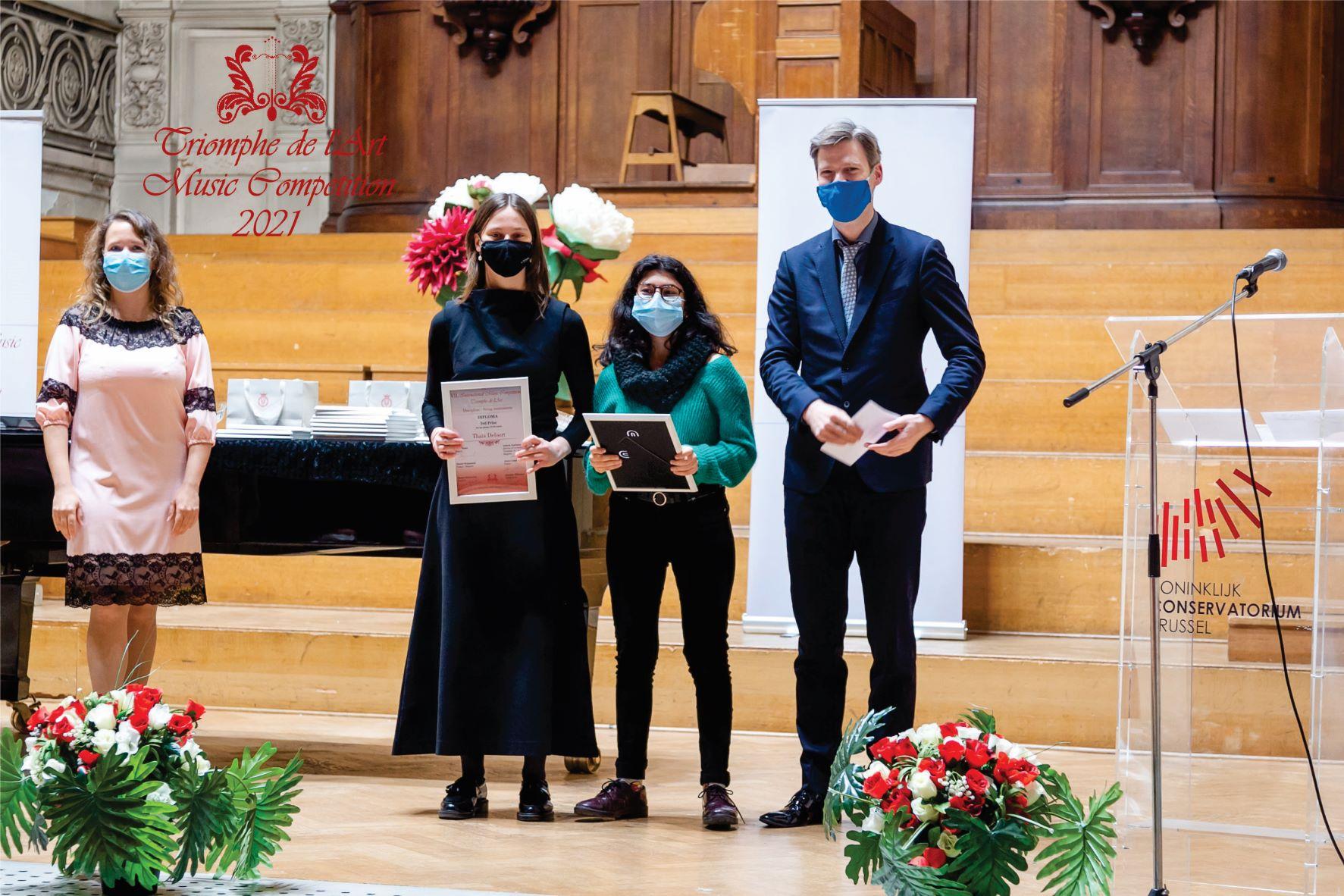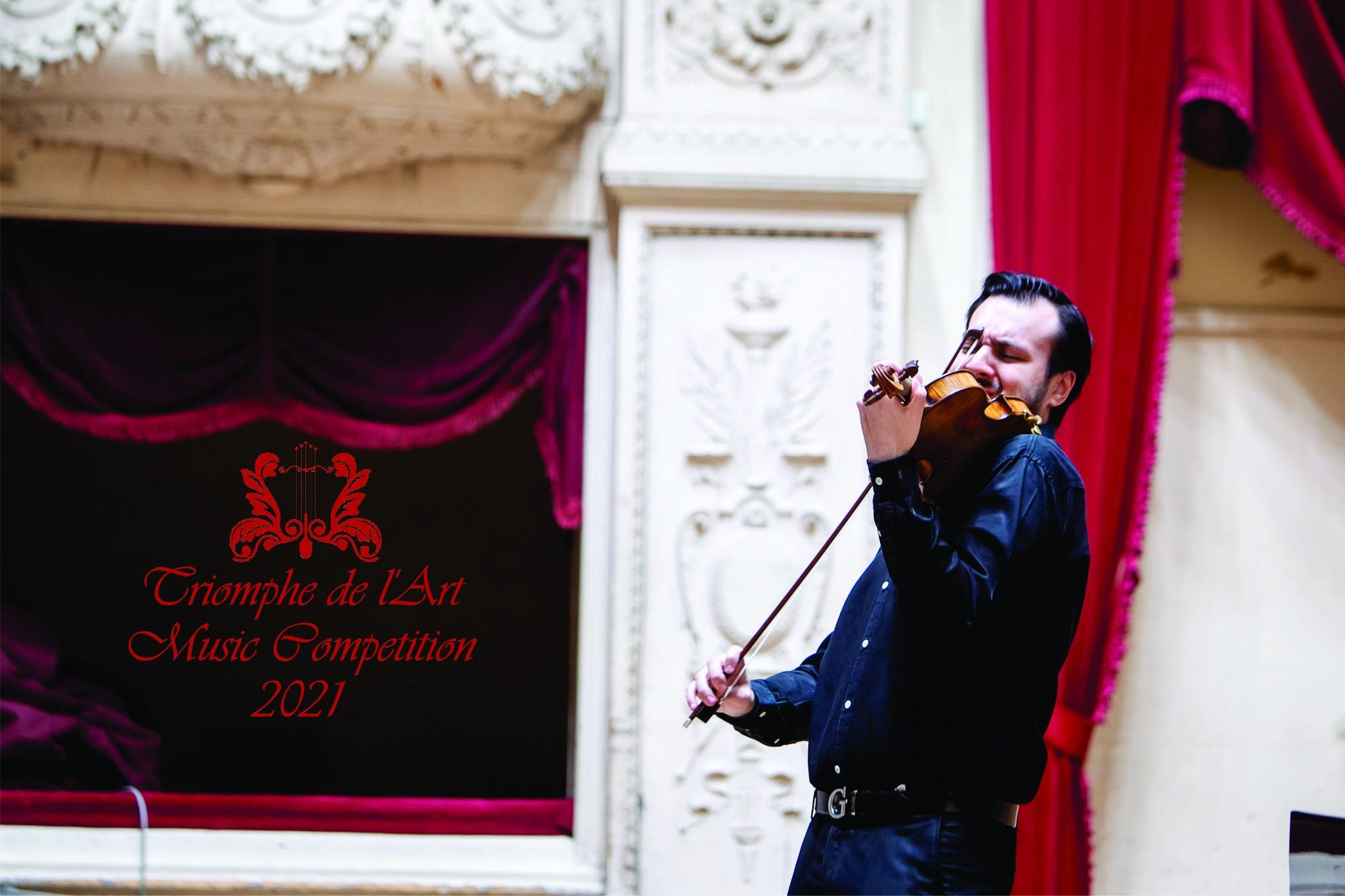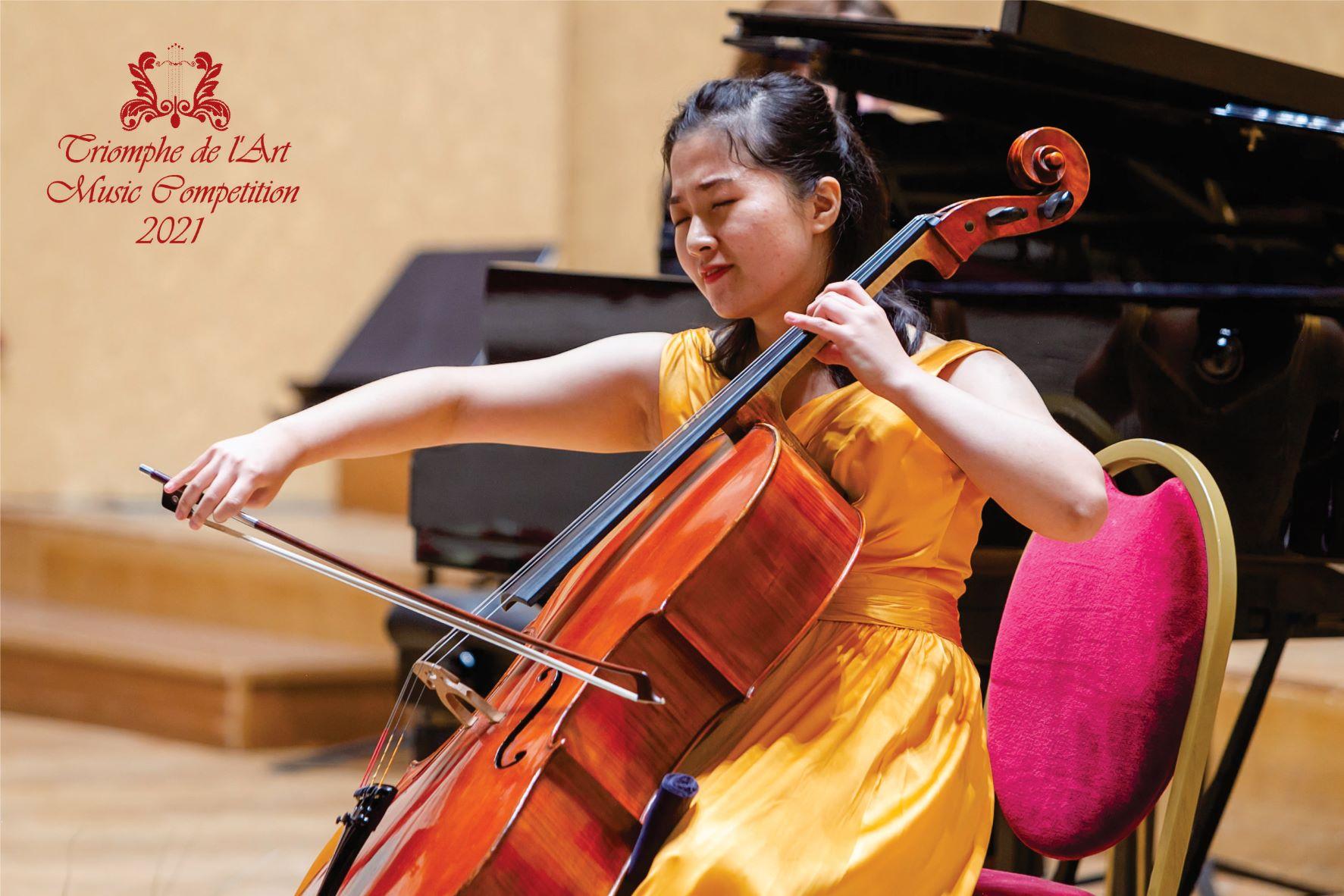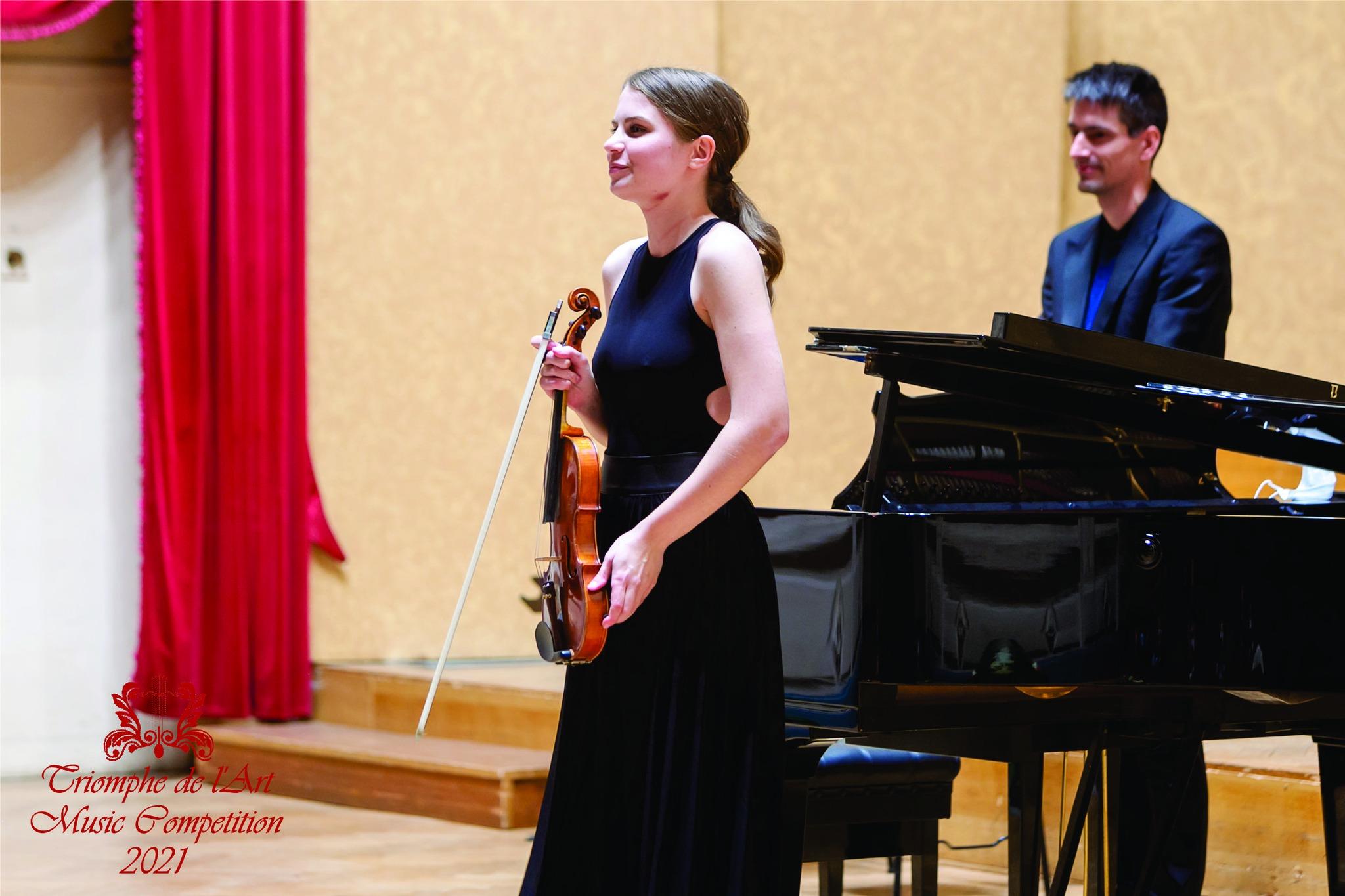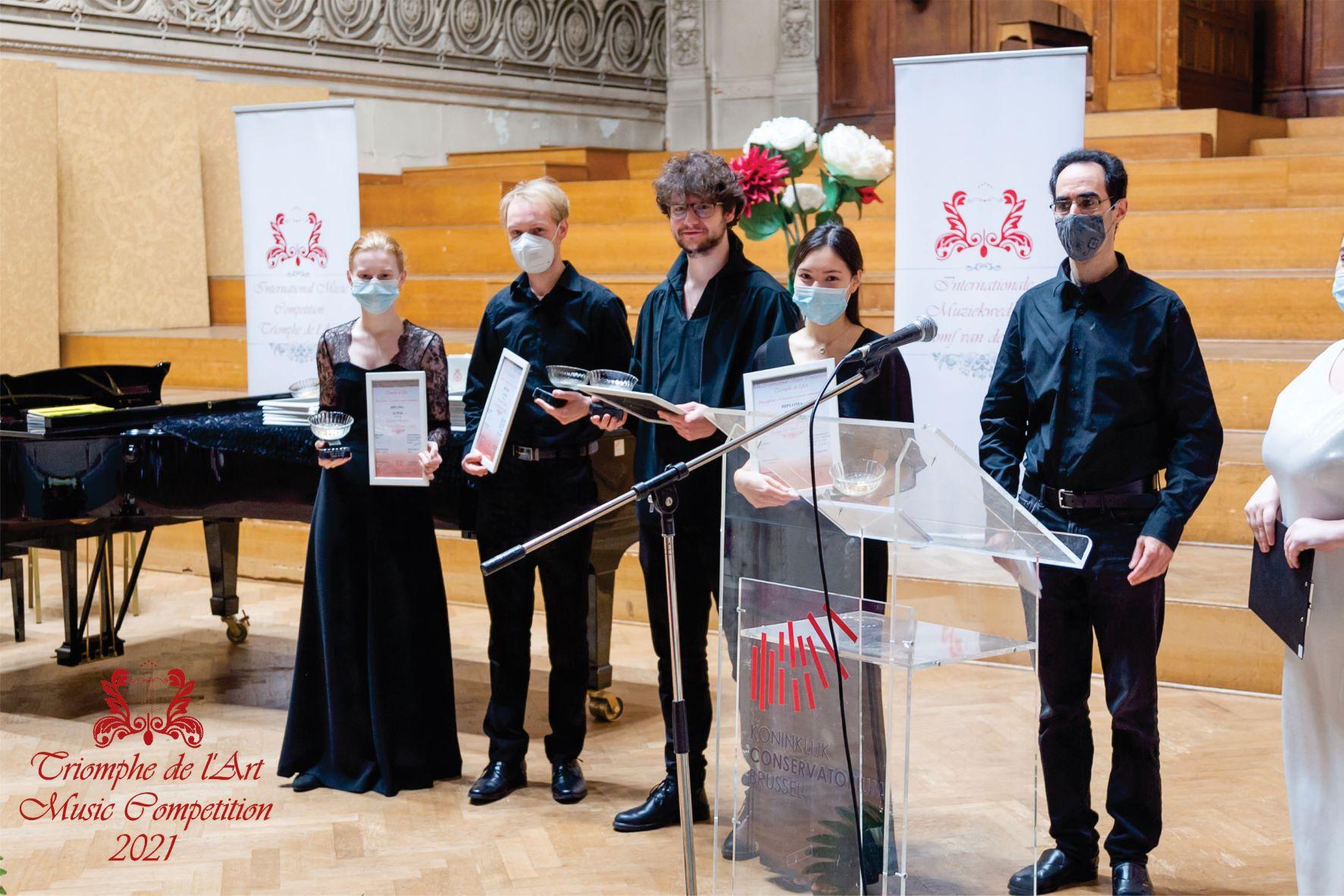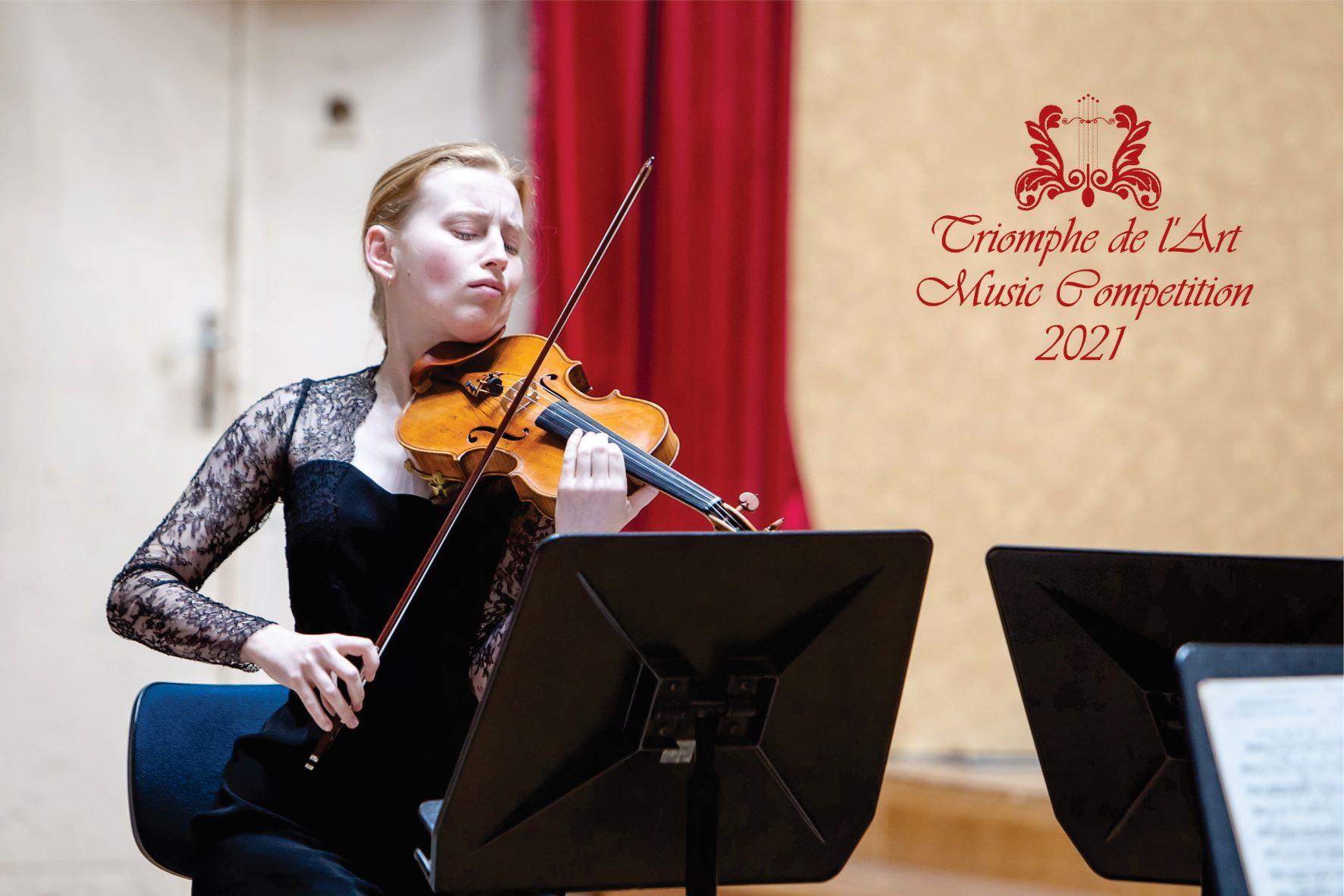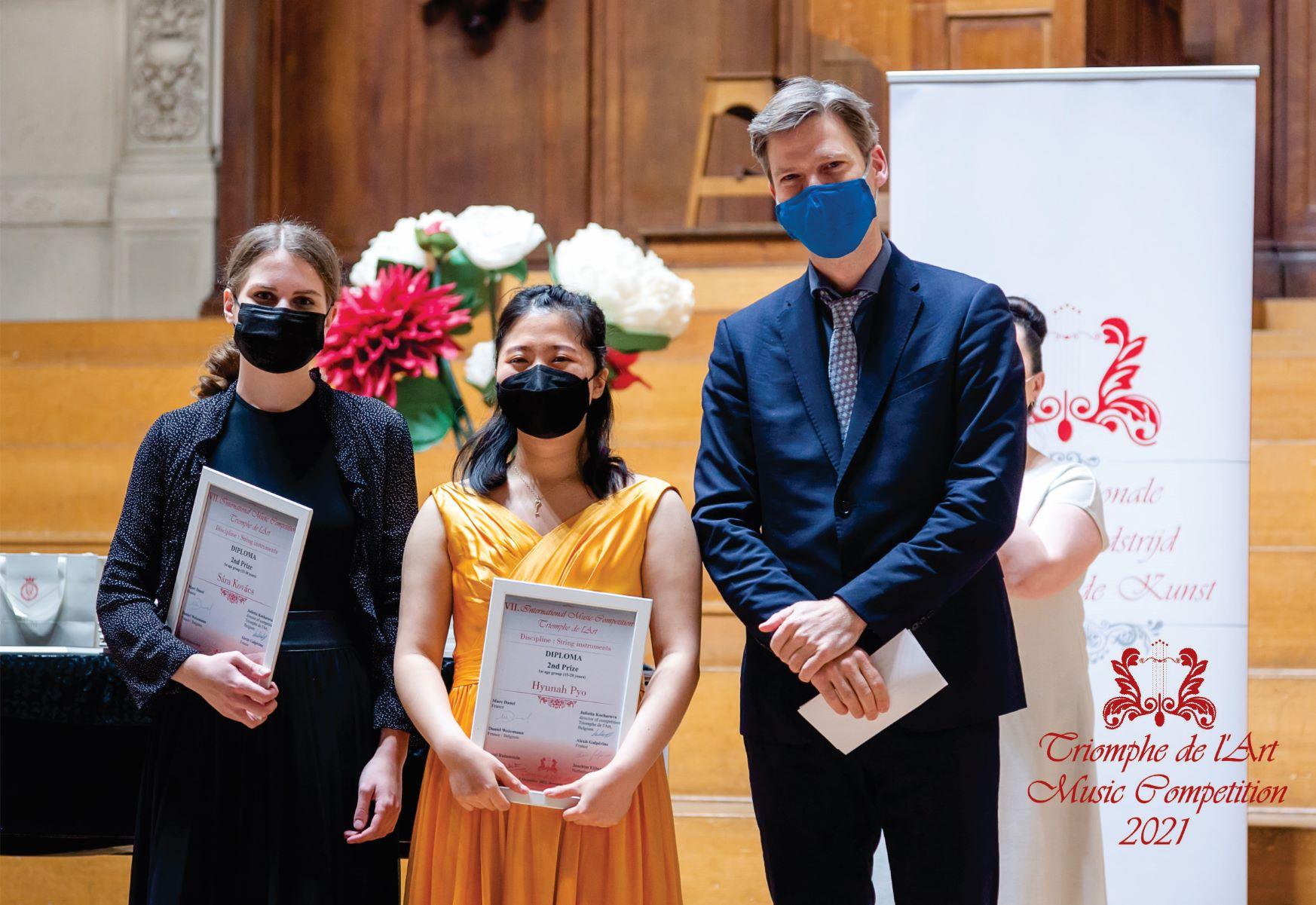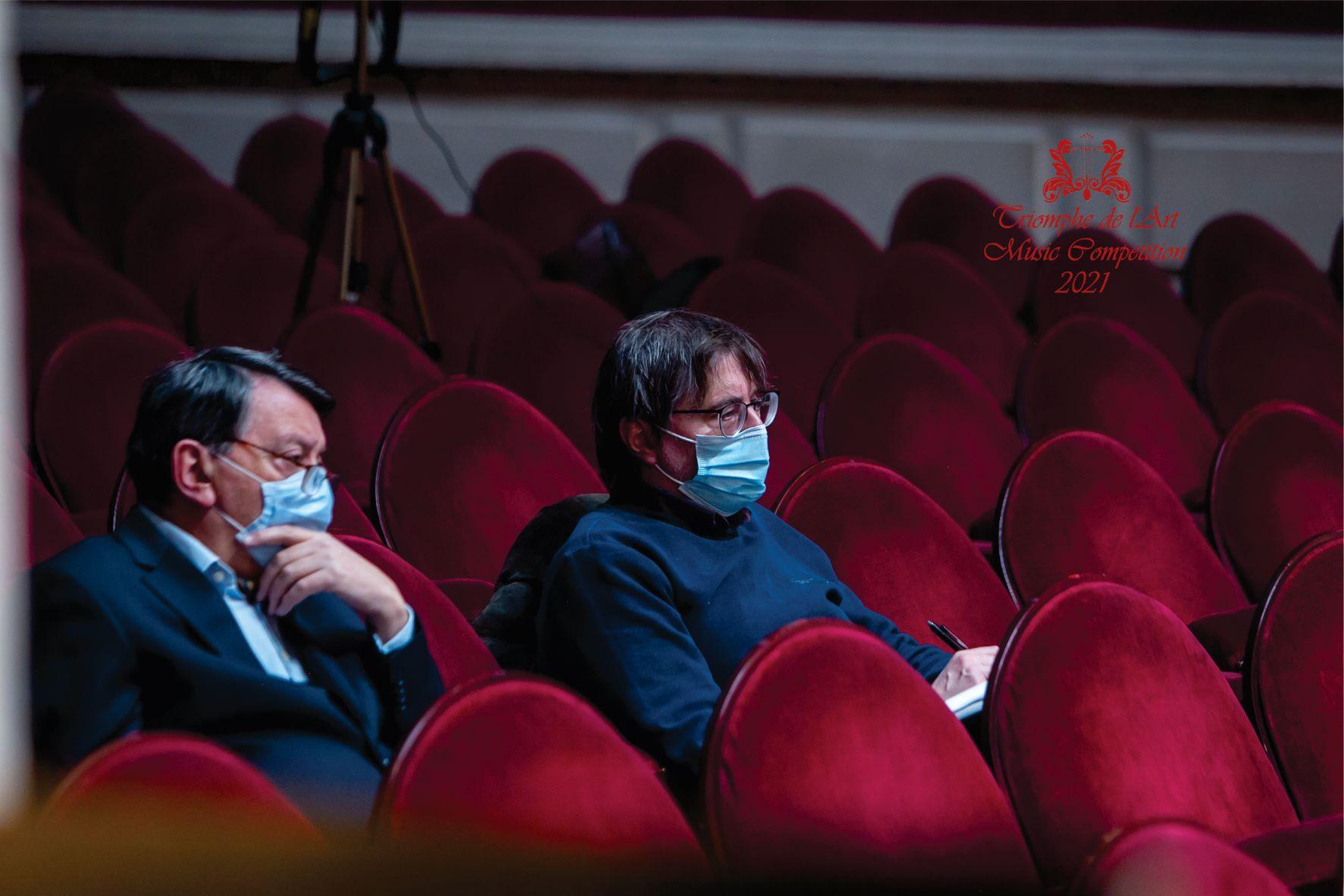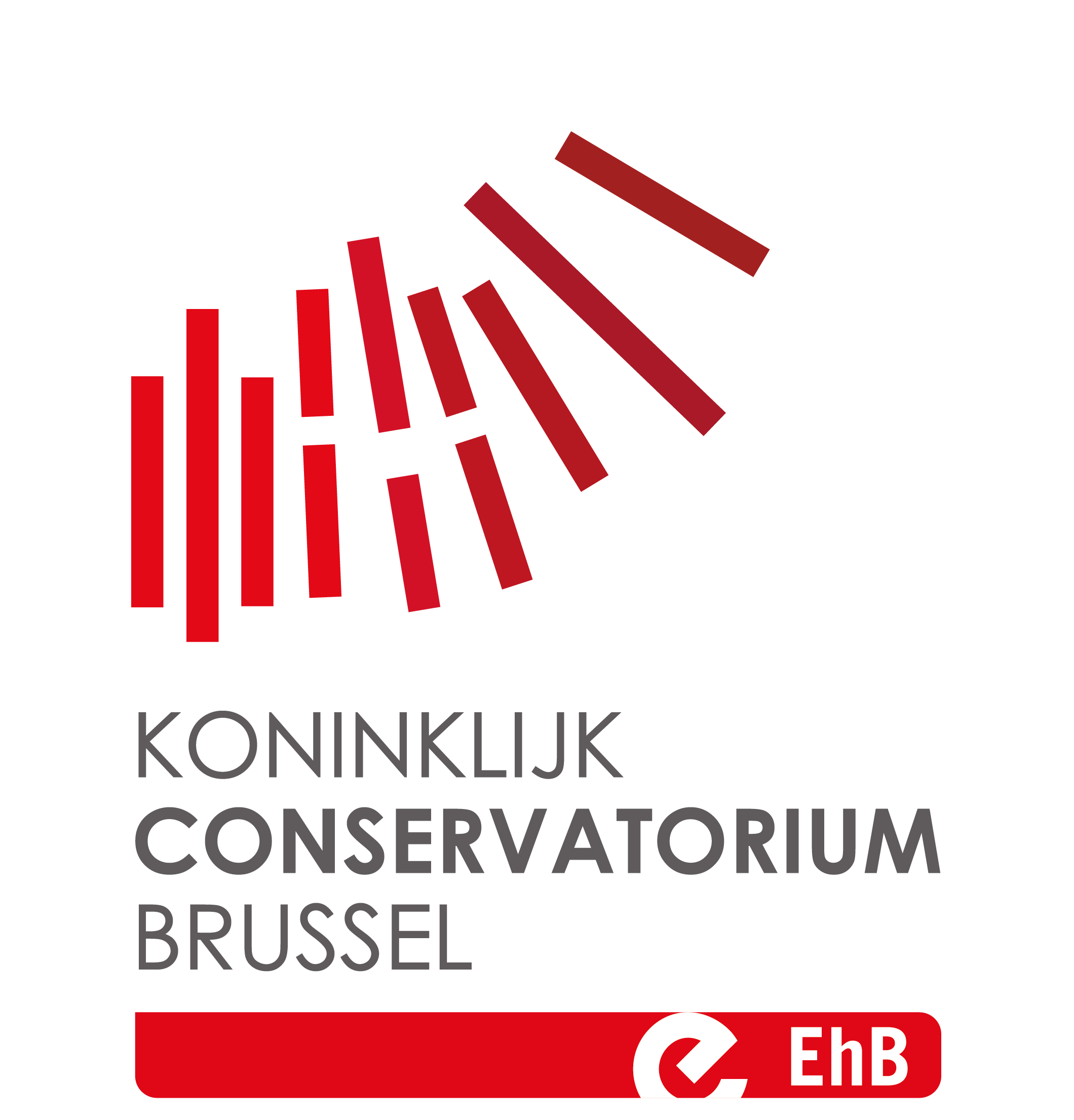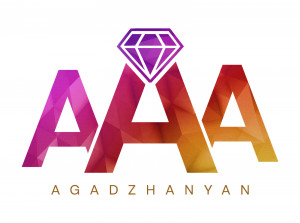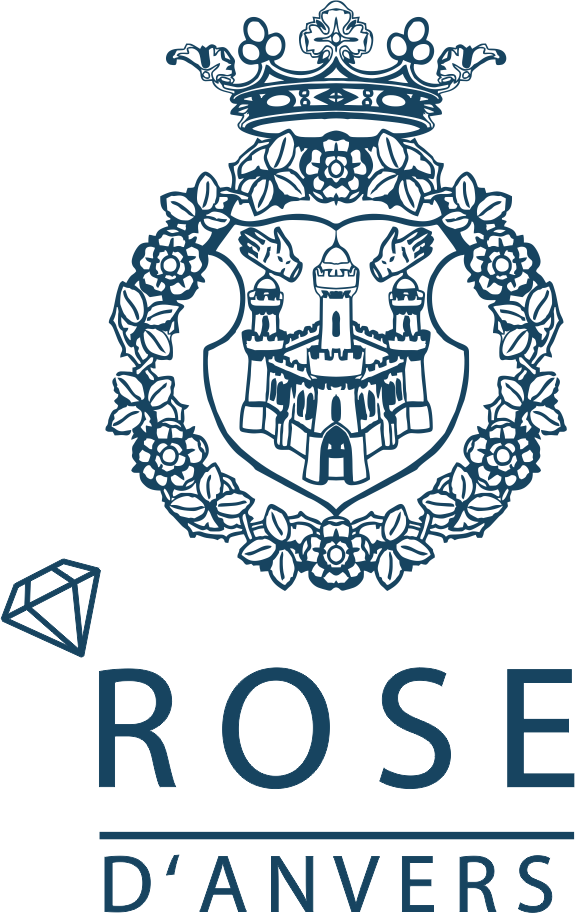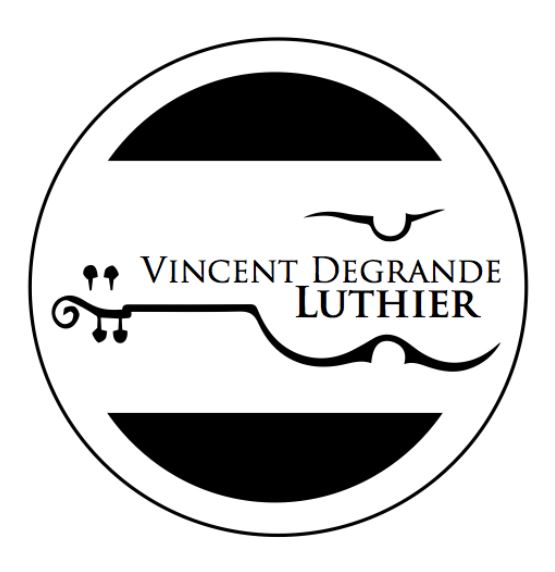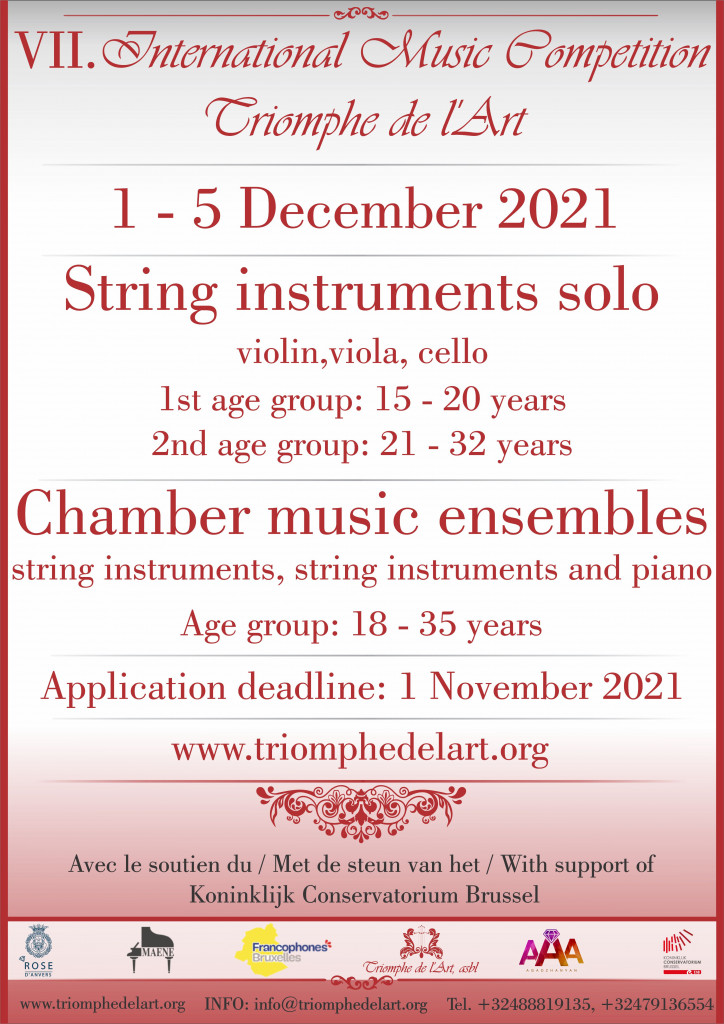
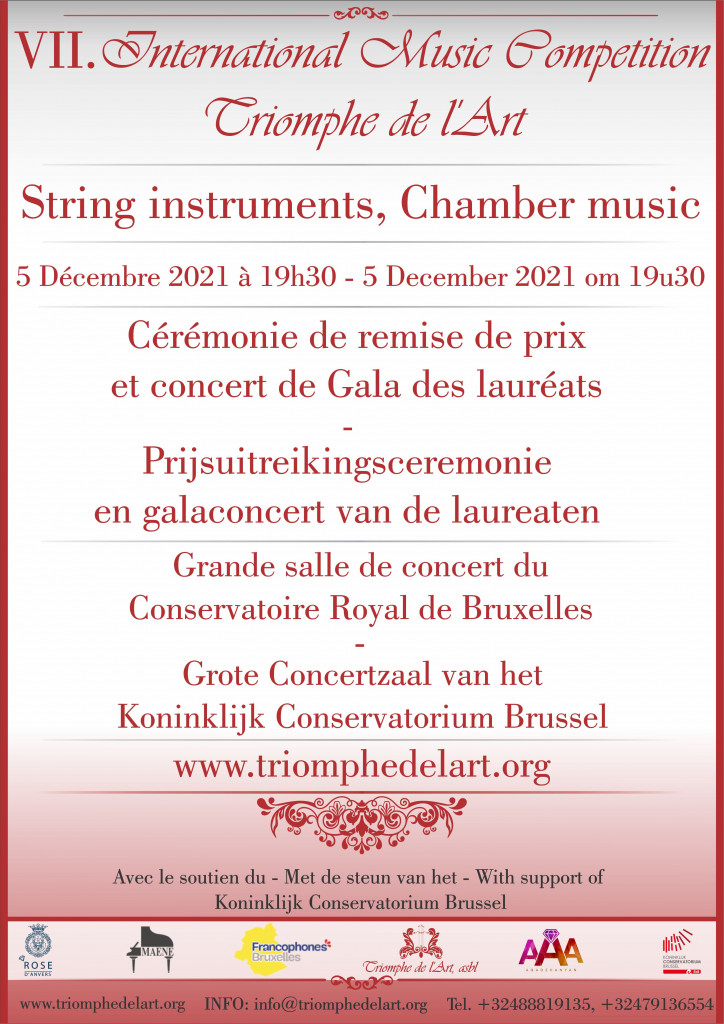
7th International Music Competition Triomphe de l’Art
1 December – 5 December 2021
Disciplines: « String instruments » & « Chamber music ensembles »
Application deadline: 1 November 2021
Competition dates: 1 December – 5 December 2021
Total amount of contest prizes: 4000 euro
Age limit is between 15 and 35 years old
Gala concert of laureates and awarding ceremony at the Big Concert Hall of KONINKLIJK CONSERVATORIUM BRUSSEL (KCB): 5 December 2021 at 19:30
In particular cases, participants out the age limits could be admitted at the competition only by the special permission from the Organizing Committee.
See rules, program, jury and other details below
Grand Prix
not attributed
1st age group – 15 to 20 years
1st prize – Léo Couralet (violin), France
2nd prize – Hyunah Pyo (cello), South Korea
2nd prize – Sára Kovács (violin), Hungary
3rd prize – Leon Korman (violin), Croatia
3rd prize – Thaïs Defoort (cello), Belgium
3rd prize – Margot Panek (violin), France
2nd age group – 21 to 32 years
1st prize – Grégoire Torossian (violin), France
2nd prize – Yanis Grisò (violin), Luxembourg
2nd prize – Vilmos Csikos (violin), Belgium
2nd prize – Aihao Zheng (cello), China
3rd prize – Oukalin Yin (violin), China
3rd prize – Quentin Vogel (violin), France
3rd prize – Adele Theveneau (cello), France
3rd prize – Sophia Fournier (violin), France
Chamber music ensembles
1st prize – Fibonacci Quartet : Kryštof Kohout (violin), Czech Republic; Luna De Mol (violin), Belgium; Ami-Louise Johnsson (viola), Sweden; Kosta Popović (cello), Montenegro
2nd prize – not attributed
3rd prize – not attributed
Special prizes
The Best performance of a work by a Belgian composer : Vilmos Csikos (violin), Belgium
Special prize from Jewellery design Arena Agadzhanyan : Justina Maria la Cour (violin), Denmark
Rose with diamonds from Rose d’Anvers : Antigone Hourt (violin), Belgium; Elen Shahinans (violin) Belgium/Armenia
Young hope prize: Léo Couralet (violin), France
Special Prize of the Jury : Aï Nakano (violin), Japon; Naomi Plays (violin), France
Presents from Peermusic, Hambourg : Young Hyeon Joo (viola), South Korea; Hyunah Pyo (cello), South Korea; Matis Griso (cello), Luxembourg; Naomi Plays (violin), France; Aï Nakano (violin), Japon; Fibonacci Quartet; Quiron Quartet.
Presents from International Association Dimitri Chostakovitch, Paris : Pelayo Cuéllar Sarmiento (cello), Spain; Fibonacci Quartet; Sylvain Debray (cello), Belgium; Ting-Wei Wu (violin), Taiwan.
Presents from Azzato shop in Brussels : Eve Gillieron (violin), France; Juliette Milone (violin), France; Juliette Nougein (violin), France; Neil Dixon (violin), Great Britain; Anouk Villard (violin), France;
Presents from Vincent Degrande, luthier à Namur : Agnès Marias (violin), France; Garance Vialatte (violin), France; Kai-Jou Chen (violin), Taiwan; Léontine Paques (violin), France;
Pablo Teijero Galdo (cello), Spain
Presents from librairie musicale Point d’Orgue : Esther Joo (violin), France
Best accompanists: Oscar Nguyen, Jerome Frejaville, David Craveira, Simon Adda-Reyss
| Day | Time | Where | What |
| Tuesday 30 November 2021 | 10:00 – 19:00 | Pianos Maene Brussels | Rehearsals with official pianists of the competition |
| Wednesday 1 December 2021 | 9:00 – 18:00 | Pianos Maene Brussels | 1st round |
| Thursday 2 December 2021 | 9:00 – 18:00 | Pianos Maene Brussels | 1st round |
| Friday 3 December 2021 | 9:00 – 18:00 | Koninklijk Conservatorium Brussel (Brussels Royal Conservatory) | 2nd round |
| Sunday 5 December | 19:30 – 21:30 | Koninklijk Conservatorium Brussel (Brussels Royal Conservatory) | Gala concert of laureates and awarding ceremony |
Violin: 1st age group – 15-20 years
A participant cannot repeat the same piece in 2 different rounds
I round – not longer than 15 mins on stage (performed by heart except for sonatas)
1. One virtuoso composition
2. One movement of classical sonata from the following list:
– Wolfgang Amadeus Mozart (KV 293 a/301/, KV 293b/302/, KV 293c/ 303/, KV 300 c/ 304/, KV 293 d/305/, KV 300 l / 306/)
– Franz Peter Schubert, Sonatas (Sonatinas) D.384, D.385, D. 408, Sonata ( Duo) D. 574
– Ludwig van Beethoven №1 Ор.12, №2 Ор.12, №3 Ор.12, №4 Ор.23, №5 (printemps)
II round – not longer than 20 minutes on stage (performed by heart)
1. Cantilena composition
2. Virtuoso piece or a concerto movement (no slow movement)
One of these 2 pieces must be written by a composer who lived before 1951.
Violin: 2nd age group – 21-32 years
A participant cannot repeat the same piece in 2 different rounds
I round – not longer than 15 minutes (performed by heart)
1. One Caprice of Henryk Wieniawski or Niccolò Paganini
2. Two contrasting movements of Johann Sebastian Bach from one of the sonatas and partitas (Chaconne is not allowed)
II round – not longer than 25 minutes (performed by heart)
Two pieces of different styles. One of them should be a major work (movement of concerto or concert piece).
One of these 2 pieces must be written by a composer who lived before 1951.
Viola: 1st age group – 15-20 years
A participant cannot repeat the same piece in 2 different rounds
I round – not longer than 15 minutes (performed by heart except for sonatas)
1. One movement of Johann Sebastian Bach Cello Suite or Johann Sebastian Bach Violin Sonata or Johann Sebastian Bach Partita transcribed for viola
2. Competitors may perform a piece or a single movement of Sonata from the following list:
– Carl Maria Friedrich Ernst von Weber Andante e Rondo ungarese
– Glinka viola sonata
– Franz Peter Schubert Arpeggione (first mov.)
– Rebecca Clarke Sonata (first mov.)
– Johann Nepomuk Hummel – Pot-Pourri op. 94 for viola
– Franz Anton Hoffmeister Concerto in B-Dur (first mov.)
– Stan Golestan Arioso
– Joseph Schubert Concerto in C (first mov.)
II round – not longer than 20 minutes (performed by heart except for sonatas)
1. One or two pieces from the following list:
– Paul Hindemith sonata for solo viola op.25 num 11 (mov. 1-2)
– Henri Vieuxtemps Caprice for solo viola
– Max Reger Suite en sol menor for solo viola – (mov. Andante y Presto)
2. One of the following pieces:
– William Turner Walton viola concerto (first mov)
– Robert Schumann Märchenbilder 1-2-3 mov.
– Robert Schumann, Adagio and Allegro opus 70
– Paul Hindemith “Der Schwanendreher” (first mov)
Viola: 2nd age group – 21-32 years
A participant cannot repeat the same piece in 2 different rounds
I round – not longer than 15 minutes (performed by heart except for sonatas)
1. One movement or two contrast movements of a Johann Sebastian Bach Violin Sonatas or Partitas transcribed for viola
2. A single movement of sonata from the following list:
– Johannes Brahms Sonata op. 120/1
– Johannes Brahms Sonata op. 120/2
– Franz Schubert Arpeggione, Sonata
– Rebecca Clarke Sonata
– Bohuslav Martinů Sonata
II round – not longer than 25 minutes (performed by heart except for sonatas)
1. One or two pieces from the following list:
– Krzysztof Penderecki Cadenza, for solo viola
– Krzysztof Penderecki Sarabanda,
– Fyodor Drouzhinin Viola sonata (free choice of movements),
– Igor Stravinsky Elegie,
– Paul Hindemith op.11 num 5- Passacaglia,
– Philippe Hersant Pavane,
– György Kurtág Signes op.5 (free choice of movements),
– Paul Hindemith sonata op.25 num 11 (mov. 3-4),
– György Ligeti Sonata (free choice of movements).
2. One or two pieces from the following list:
– Robert Schumann Märchenbilder
– Benjamin Britten Lachrymae
– Sergei Prokoffiev Romeo and Juliette (arr.by Borisovsky) (free choice of movements)
– George Enescu Concertpiece
– Paul Hindemith Sonate op.11/4
– Niccolò Paganini Sonata per La Grand Viola
– First movement from the viola concert by Béla Bartók (any version)
– Second and Third movement from the viola concert by Béla Bartók (any version)
– First movement from the viola concert by Paul Hindemith “Der Schwanendreher”
– Second and Third movement from the viola concert by Paul Hindemith “Der Schwanendreher”
– First and Second mov. from viola concert by Alfred Schnittke
Cello: 1st age group – 15-20 years
A participant cannot repeat the same piece in 2 different rounds
I round – not longer than 15 minutes (performed by heart except for sonatas)
1. A short virtuoso composition by David Popper or Adrien François Servais.
2. One movement by candidates choice from the following list:
– a celloconcerto from Joseph Haydn in C major Hob.VIIb.1 or in D major Hob VIIb.
– a sonata from the second half of the 18th century or from the 19th century such as Boccherini, Beethoven, Chopin, Mendelssohn, Brahms, Schumann, etc…
II round – not longer than 20 minutes (performed by heart except for sonatas)
Full pieces or a movement from a concerto
1. Cantilena compostion
2. A virtuoso compositon (not slow)
One of these 2 pieces must be written by a composer who lived before 1951.
Cello: 2nd age group – 21-32 years
A participant cannot repeat the same piece in 2 different rounds
I round – not longer than 15 minutes (performed by heart)
1. One caprice by Adrien François Servais, Auguste Franchomme or Alfredo Piatti.
2. Johann Sebastian Bach two contrasted movements from one of the six suites.
II round – not longer than 25 minutes (performed by heart)
Two pieces from different styles. One of them should be a major work (movement of concerto or concert piece).
One of these 2 pieces must be written by a composer who lived before 1951.
Chamber music ensemble (String instruments or String instruments with piano): 18-35 years
A participant cannot repeat the same piece in 2 different rounds
I round – not longer than 15 minutes
Two parts of different works from different period. One of these 2 pieces must be written by a composer who lived before 1951.
II round – not longer than 25 minutes
One composition of the composer lived before the year 1951
1. General Terms and Conditions
3. The process of the Competition
4. General rules and other information
1. General Terms and Conditions
1. The competition is open to young candidates of all nationalities. They are divided into 2 disciplines:
String Instruments (violin, viola, violoncello )
1st age group – 15-20 years
2nd age group – 21-32 years
(inclusive at the time of the registration)
Chamber Music Ensembles (string instruments or string instruments with piano): 18-35 years (inclusive at the time of the registration)
2. The competition consists of 2 public rounds
3. The order in which participants will perform will be determined by random drawing. This order is kept through all rounds of the competition. All participants, however, should be ready to a change in the schedule and order of performances
4. Member of jury does not attribute points to his/her own students. Also he/she must not vote for a candidate who is, or has been, one of their pupils (private or public) or who is a relative of the jury member in question
5. Awards are per category and age group and they may be shared or not attributed at the discretion of the Jury and Organizing Committee :
1 prize — diploma and laureateship, special prize
2 prize — diploma and laureateship, special prize
3 prize — diploma and laureateship, special prize
6. Jury and the Organizing Committee may establish special prizes for participants, teachers and accompanists:
– The Best performance of a work by a Belgian composer
– Best accompanist
– Best viola player of the competition
– Best cellist of the competition
– Best violinist of the competition
– Young hope Award (attributed by association Triomphe de l’Art, asbl)
– Special prizes(s) from Triomphe de l’Art, asbl : concert at the annual music festival “Triomphe de l’Art”
– Special prize from Jewellery design Arena Agadzhanyan
– Special prize from Rose d’Anvers (Rose with diamonds)
– Masterclass from one or several members of jury
– Special prizes from AZZATO shop in Brussels : vouchers to buy Azzato products
– Special prizes from Peermusic Classical Europe and Chostakovich Association Paris : Books with music from the catalogue
7. The jury has the right:
a) to award not all prizes;
b) to share prizes (except Grand Prix) between candidates;
c) to award the diploma of “Laureate of international competition Triomphe de l’Art”;
8. The decision of the Jury is final and irrevocable
9. The results of the competition are announced not later than the day of the competition’s final gala concert
10. Pianists designated by the organizers (official pianists) of the competition are at the disposal of the participants for some additional fee. If a participant needs such a pianist, it is necessary to indicate so in the application form. Participants may, nonetheless, have a personal accompanist. If it’s the case, it should be indicated in the application form (as well as the accompanying instrument). The organizers of the competition provide only piano accompanists as well as only piano instruments. All other kinds of accompanying instruments must be brought by the candidate (or his or her personal accompanist) at his or her own expenses. The personal accompanists’ travel and accommodation expenses are NOT covered by the competition. The schedule of rehearsals are to be decided by mutual agreement between accompanist and participant. Scores should be sent, along with the application form, to the following e-mail:
triomphe.de.lart.competition@gmail.com
Scores written by hand will not be accepted.
Candidate has to send the scores for the official pianists (if candidate does not bring his own pianist for accompaniment) of the competition together with his/her application for the competition. If candidate sends the scores after the 1 November 2021, official pianists have a right to refuse to accompany the candidate or to ask for additional fees.
11. The participant has a right to choose the order in which he/she will play the different works in his/her program. He has to write this order in the application form as well as the duration of each composition in his/her program. After 1 November 2021 the candidate’s program and its order cannot be changed.
12. By participating in the competition, the candidates and their accompanists grant to the Competition and association Triomphe de l’Art, asbl the right to record, to reproduce and to arrange for the reproduction of their performances in the competition and at the concerts in any existing or future medium, as well as the right to broadcast their performances by any televised or radio broadcast means, including the Internet, cable networks, terrestrial or other broadcasting, live or pre-recorded, in Belgium or abroad
13. All the participants qualified for the 2nd round and their accompanist are required to perform with no claim to any compensation at the final Gala concert of the competition as well as at the 2nd additional concert if it is confirmed by the Organizing Committee. At the Gala concert, participant must perform the work of the composer who lived before the year 1951 unless mandated otherwise by the Organizing Committee
14. Winner of the Grand Prix and the winners of the 1st prize of the previous editions of the contest are eligible to participate in the next contest only by
applying to another age group or/and another category
15. In the category “String instruments” the entire program of the participant must be performed live by heart. The exception is made for sonatas. Participants are allowed to use scores when playing sonata. In the category “Chamber music ensemble” participants may perform with scores.
16. In case of non-fulfillment of the mentioned conditions, the musician will lose all his/her prizes
2. Entry Conditions
1. Application deadline: 1 November 2021
2. Completed (in English, French or Dutch) and signed application forms must be sent by e-mail to triomphe.de.lart.competition@gmail.com . Application forms can be downloaded at the competition web page under the tab Application forms
In the application form the candidate MUST indicate:
First and Last name of the candidate
Date of birth and age group
Candidate’s School / University (or other educational institution if applicable) and contacts of this institution, candidate’s degree obtained from this institution or the future degree and candidate’s actual year of study
Home address, postal index, telephone number, e-mail.
Program to be performed at each round of the competition including the composers’ names, names of the compositions, duration of compositions and order of compositions
First and last names of the accompanist (if candidate comes with his/her own accompanist) his/her home address, telephone number and e-mail.
The Direction of the competition reserves the right to use all the information and photos in order to provide them to the media. All rights (copyrights) to the recording during the competition belong to the association “Triomphe de l’Art, asbl”
Candidates admitted to the competition will receive an official invitation. After receiving the invitation, the candidate cannot change his or her announced program for the competition.
3. One or more official documents (originals or certified copies) establishing the candidate’s place and date of birth
4. A short CV in English, French or Dutch (that can be published) including details of education, names of teachers, principal concerts, recitals, and awards
5. Candidate must send to the competition one photo of good quality (minimum 300 dpi) for reproduction in the official brochure of the competition. It should be taken not earlier than 6 months before the application. He/she must also send another color passport photo in format 3×4
6. Copies of diplomas of winners, publications in the press, concert reviews, etc… if applicable.
7. Application fee
* String Instrument discipline:
1st age group 15 – 20 years : 80 euros
2nd age group 21 – 32 years : 100 euros
* Chamber Music Ensemble discipline:
18 – 35 years : 50 euros from each participants of the ensemble
For the students of KCB in the String Instruments category (for all age groups) application fee is 50 euros.
For the students of KCB in the Chamber Music category the reduced price is 25 euros for each participants who studies in KCB. For participants who do not study in KCB, the price is not reduced (50 euros).
KCB valid student card must be submitted with the application by email in order to get the reduced price.
Application fee must be paid via a bank transfer (banking commissions to be paid by the candidate) to the following bank account by 1 November 2021.
IBAN: BE27 0018 5876 0173
BIC: GEBABEBB
Account holder: Triomphe de l’Art, asbl
PLEASE, DO NOT FORGET TO SEND US BY E-MAIL A BANK DOCUMENT CONFIRMING THE PAYMENT.
PLEASE WRITE YOUR SURNAME AND A COUNTRY IN THE COMMUNICATION OF YOUR BANK TRANSFER, THAT WE CAN IDENTIFY YOUR TRANSACTION
CONFIRMATION OF THE ACCEPTANCE WILL BE SENT TO THE CANDIDATE BY EMAIL SOON AFTER HIS COMPLETE APPLICATION IS SUBMITTED BUT NOT LATER THAN 1 NOVEMBER 2021
8. The Organizing Committee is not responsible for the loss of documents and materials submitted by the candidate for participation in the competition. The entrance fee as well as submitted materials will under no condition be returned to candidate.
9. All materials sent to the Organizing Committee should be available in one of the official languages of the competition: English, French or Dutch. The Organizing Committee may accept materials in a non-official language of the competition, but in this case it must be accompanied by a clear translation in one of the official languages of the competition(English, French or Dutch).
10. In the case candidates and persons accompanying them need a visa in order to come at the competition, they must apply and pay for visa or any other travel documents on their own. If necessary, the Organizing Committee may assist candidates in obtaining visa. The Organizing Committee, at the request of the candidate, can send an official invitation for the contest. At the same time, the competition and The Organizing Committee are not responsible for eventual refusal of visa or any other legal issues preventing the candidate to arrive at the competition. Participants are also responsible for paying any transportation fees for their instruments.
3. The process of the Competition
1. Each candidate admitted to take part in the public rounds agrees to participate in those rounds according to the time and the date defined by the Organizing Committee, unless prevented from doing so by illness or accident certified by a legal attestation from a doctor, police or other official. In this case, the time and the date of his or her performance may be modified at the discretion of the Organizing Committee.
2. In all rounds the candidate performs with accompaniment or a cappella.
3. If the participant performs with the official accompanist of the competition, the participant must bring exactly the same version scores of all the performed works.
4. Participants will cover their own travel expenses, as well as food and accommodation
5. At the each round and at the gala concert, participant must be dressed in the concert suit and shoes.
6. The organizing committee can provide participants with recommendations for hotels or Bed & Breakfasts. Booking and payment is made by the participants themselves. The organizing committee, without any guarantees, can assist in providing accommodation
7. Travel expenses and stay during the competition of parents, personal accompanists, teachers or any other accompanying persons will be the responsibility of the participant. According to preliminary applications, the Organizing Committee may assist in arranging accommodation of these persons, as well as send them an invitation.
8. If, after being eliminated from the contest, the participant and his or her delegation want to stay until the end of the competition, they must pay their own accommodation during this period.
9. The Organizing Committee will provide the contestants with more information about public transportation and possible accommodations places in Brussels
10. Performances of participants will be evaluated by an international jury by secret ballot
11. The jury’s decisions at all stages are final and not subject to discussion, review, or appeal
12. The jury has the right to interrupt the candidate’s performance. The jury and the Organizing Committee have the right to cut the program of the candidates by removing one or several pieces from the program or by removing some part of the performed composition
13. The day before the gala concert the Director of Competition and the Jury have the right to pick a piece for the candidate from his or her repertoire to perform at the gala concert.
14. Director of Competition and the Jury will select candidates who will perform at the final gala concert. Selected candidates must play at the gala concert. If selected candidates do not perform the selected pieces at the gala concert, the Organizing Committee reserves the right to put the person out of the competition, to withdraw the title of winner, diploma or any other special prize, title or any other reward won or earned at the competition
4. General rules and other information
1. The final decision for all questions that arise in the process of organizing and conducting the contest are up to the Organizing Committee.
2. In case of violation of the contest rules, the Organizing Committee and the Jury have the right to remove the participant from the contest
3. Participants and jury members must abstain from making any statements in the media during the contest unless mandated by the Organizing Committee
4. Association “Triomphe de l’Art, asbl” has the exclusive rights (applicable to all countries) to broadcast audio /video recording, editing, production and distribution of materials in all rounds of the competition, as well as all the events of the contest, including the opening and closing ceremony of the contest. Association “Triomphe de l’Art, asbl” has the exclusive right to use the recorded audio / video content for free and without obtaining the permission of the participants, accompanists and jury members who took part in concerts during the competition
5. No recording audio or video devices are allowed at all the rounds and gala concert (including interviews) of the competition, unless officially mandated by the Organizing Committee
6. The association “Triomphe de l’Art, asbl” has the right to transfer the rights specified in point 5 of this Regulation to third parties
7. The official languages of the competition are English, French and Dutch. The texts in English are legally binding. If anyone wants to make an official translation of these terms or of other materials of the competition, this person must notify the association “Triomphe de l’Art, asbl” or The Organizing Committee about their actions and get the agreement. Without such agreement The Organizing Committee and the association “Triomphe de l’Art, asbl” are not responsible for possible problems caused by inaccuracies in the translation of the above materials
8. Medical insurance and insurance against loss and damage to the instrument or luggage in case of an accident, fire or theft while traveling is made at the personal expense of participants. If the participant’s insurance is not in order, the contest is not responsible and does not cover any medical expenses.
9. Participants of the competition should not give any public performances during the competition, except for performances allowed by Organizing Committee. This condition is valid until the end of the gala concert.
10. Force Majeure. The contest may be canceled or postponed due to epidemics, fires, earthquakes, strikes, war, delays of flights or other transports, and other force majeure.
11. The candidate must not play his own compositions.
12. The candidate must submit the name of the composer, the full name of the composition, tonality, opus number, the duration and the publication of each composition
13. The candidate may decide on the repeats in the composition, provided that the total duration of the work will not exceed the allowed duration.
14. Changes to the submitted program are not allowed after 1 November 2021, unless exceptionally sanctioned by The Organizing Committee
15. After the contest The Organizing Committee may organize a concert tour for the winners, where they are required to participate in mutual agreement between winners and The Organizing Committee
16. If candidate misses his/her scheduled performance at the round of the competition, it is at the discretion of the Organizing Committee to reschedule (or not) candidate’s performance at the round. If the Organizing Committee cannot find the possibility to reschedule the performance, the candidate is automatically eliminated from the competition. Candidates must be present in KCB or Piano Maene at least 1 hour before their scheduled performance.
17. The Organizing Committee has a right to remove a discipline or an age group from the competition due to the small number of participants in this category or age group. The candidates of the removed category/age group will be immediately informed about such decision. Application fee paid by the candidates already applied to this category or age group will be reimbursed by the association “Triomphe de l’Art, asbl”.
18. Participation in the competition of musicians, members of jury, accompanists and others means that they agree with all the above conditions. In case of violation of conditions of the competition, the Organizing Committee reserves the right to put the person out of the competition, to withdraw the title of winner, diploma or any other special prize, title or any other reward won or earned at the competition
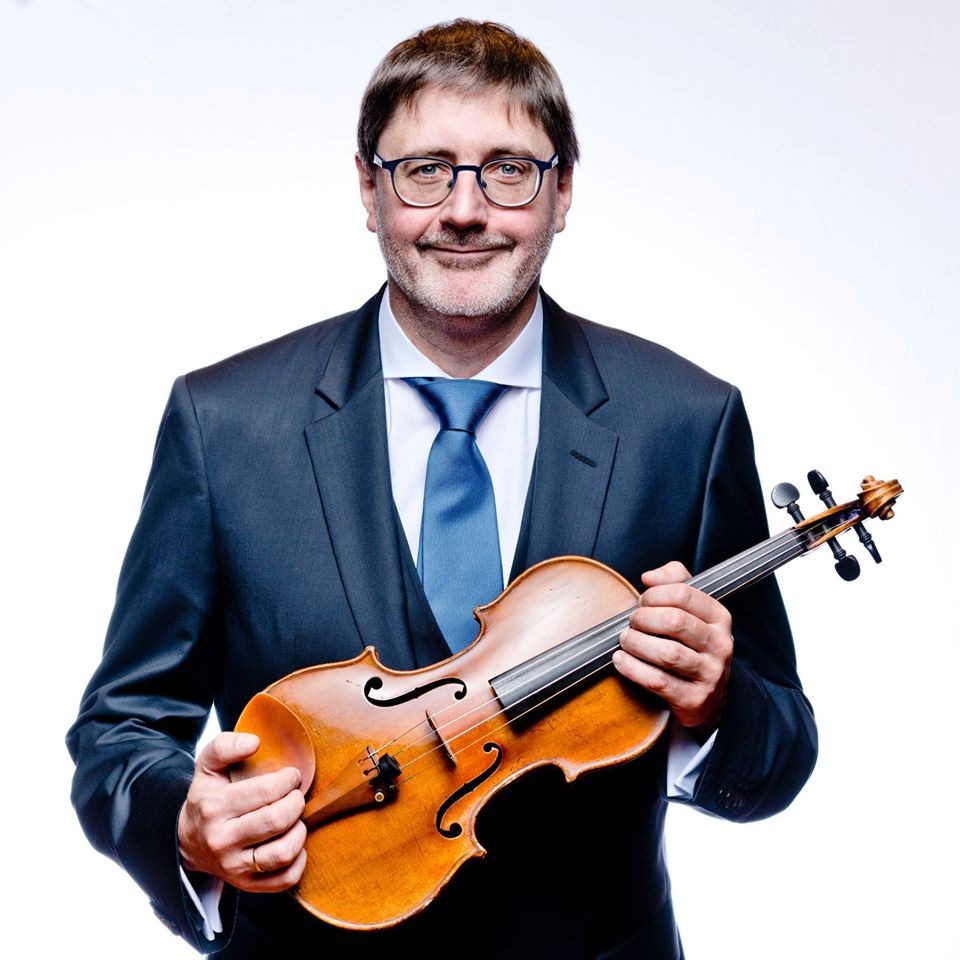
Marc Danel (France)
Violinist Founder of the famous Quatuor Danel
Artistic director of the Dutch National String Quartet Academy (Amsterdam), Netherlands Professor at Lyon Conservatoire (CNSMD), France Professor at The Music and Education Higher School of Namur, Belgium
Marc Danel grew up in Lille, France, where both he and his sister learned violin with Jezdimir Vujicic. He continued his studies with Prof Igor Ozim in Cologne graduating with high hours in 1992.
In 1991, he founded the Danel Quartet, studying extensively with the Amadeus and Borodin Quartets, as well as with Pierre Penassou, Hugh Maguire, Walter Levin and Fiodor Druzhinin.
As leader of the quartet, he was major prizewinner of all the six competitions they entered between 1991 to 1995, including Evian, London and St Petersburg.
Since 1991, Marc Danel has performed 2500 concerts with the quartet including 25 performances of the complete cycle of Shostakovitch quartets and numerous performances of the Beethoven, Weinberg and Bartok cycles in the major halls in Europe, USA, Russia, China, Japan, Taiwan, South America and Central Asia. The quartet have recorded more than 20 CDs, garnering numerous awards in Europe and the US.
The quartet have championed the great but neglected soviet composer Mechtislav Weinberg, playing his quartets extensively since the ‘90s and recording the all of his 17 string quartets, (2009). For Weinberg’s centenary this year, the quartet will give 7 performances of the complete cycle of quartets, some of which the quartet have premiered. The quartet residence at Manchester University.
Marc Danel is artistic leader of the Dutch National String Quartet Academy (NSKA), many students of which have won major competitions. A highly sought-after teacher, he teaches at CNSDM Lyon and IMEP Namur, and at Manchester University where the quartet are artists in residence. He has also given Masterclasses in Europe, USA, Japan, Taiwan, Bielorussia and has a regular collaboration with the National Youth Orchestra of Chile.
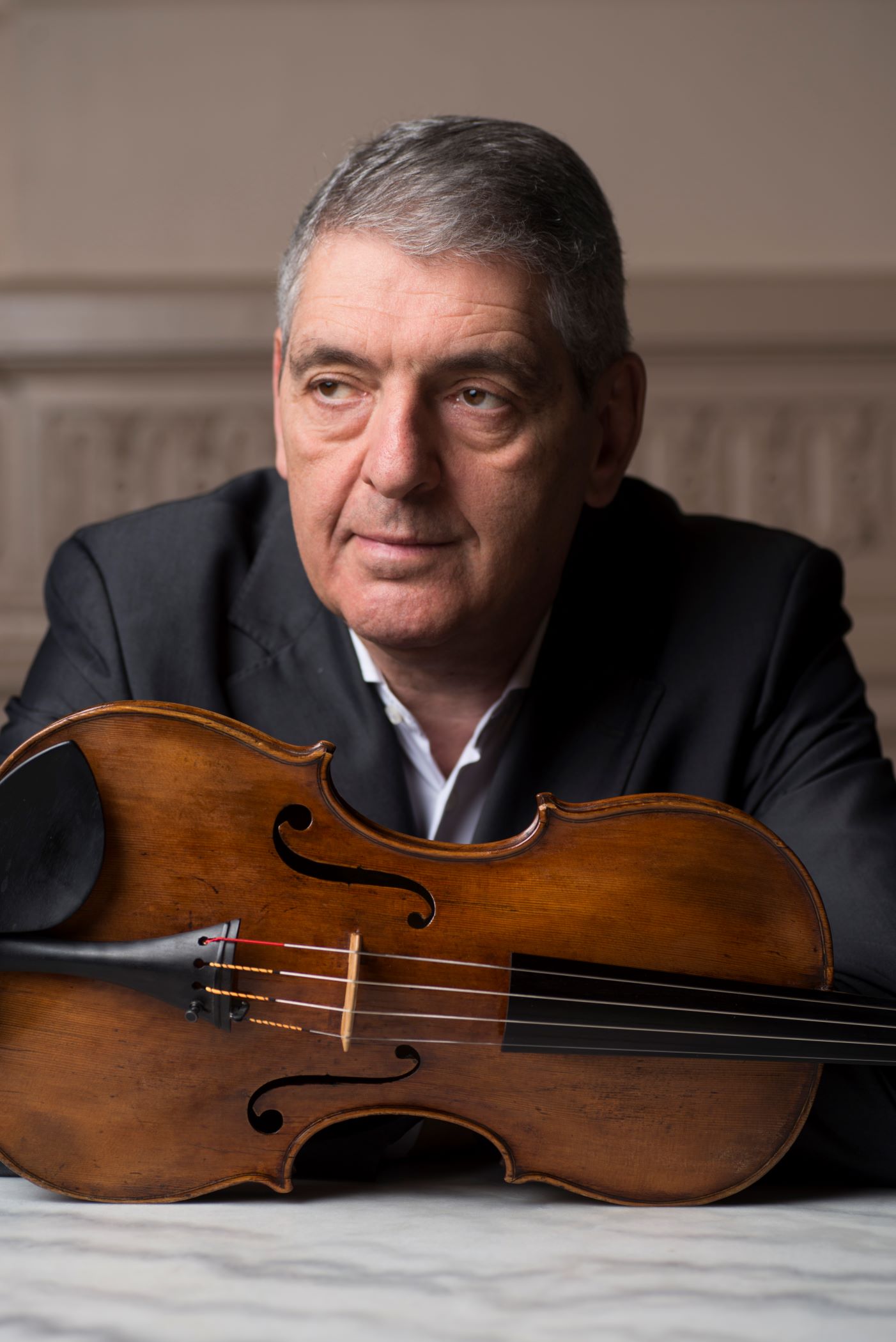
Daniel Weissmann (France/Belgium)
Managing Director of The Royal Liège Philharmonic Orchestra Violist & Violinist
Daniel Weissmann is a musical expert, characterized by an extraordinary artistic expresivity, with a career which is remarkable due to its dynamism and complexity. The French musician was born in 1956 and studied violin and chamber music at the „Ecole Normale de Musique” in Paris and the „Royal Conservatory” in Brussels.
His early professional experiences made him a major figure in the artistic world, both as a musician and as an artistic director. His experience as an artistic director began with his collaboration as a general delegate with the Dokhan Foundation, the main partner of the Versailles Baroque Musical Center and the Versailles Palace Musical Autumn, which functions under the auspices of „Fondation de France”. He worked for a decade as a musical expert for the Bourgogne Commission for Cultural Affairs and Music within the Culture and Communication Ministry.
In 2003 Daniel Weissmann collaborated with the Denon Museum for which he conceptualized and created a Festival and an exhibit in honor of Pierre Baillot and the 19th Centrury French Violin School. Following the success of this project he created the Baillot Foundation which functions under the auspices of the Luxembourg Ministry of Culture, Research and Higher Learning. His career as a musician was launched in 1984 when he began playing the violin in the Bergonzi trio which he founded. He has a rich academic activity . In 1999 Daniel Weissmann founded “Mosaïques – Centre de création et de diffusion musicales” (Mosaics – Centre for creation and musical broadcasting).
In 2007 the city of Dijon ask him to conduct the new project of a region orchestra involving Opéra orchestra and Camerata de Bourgogne ; this orchestra is now associate to the Opéra de Dijon and after this sucess, he is apointed as général manager of Liège Royal Philharmonic orchestra since 2015.
As a violist the begin a collection, under the belgian label Fuga Libera-Outhere music, on the romantic viola repertoire.
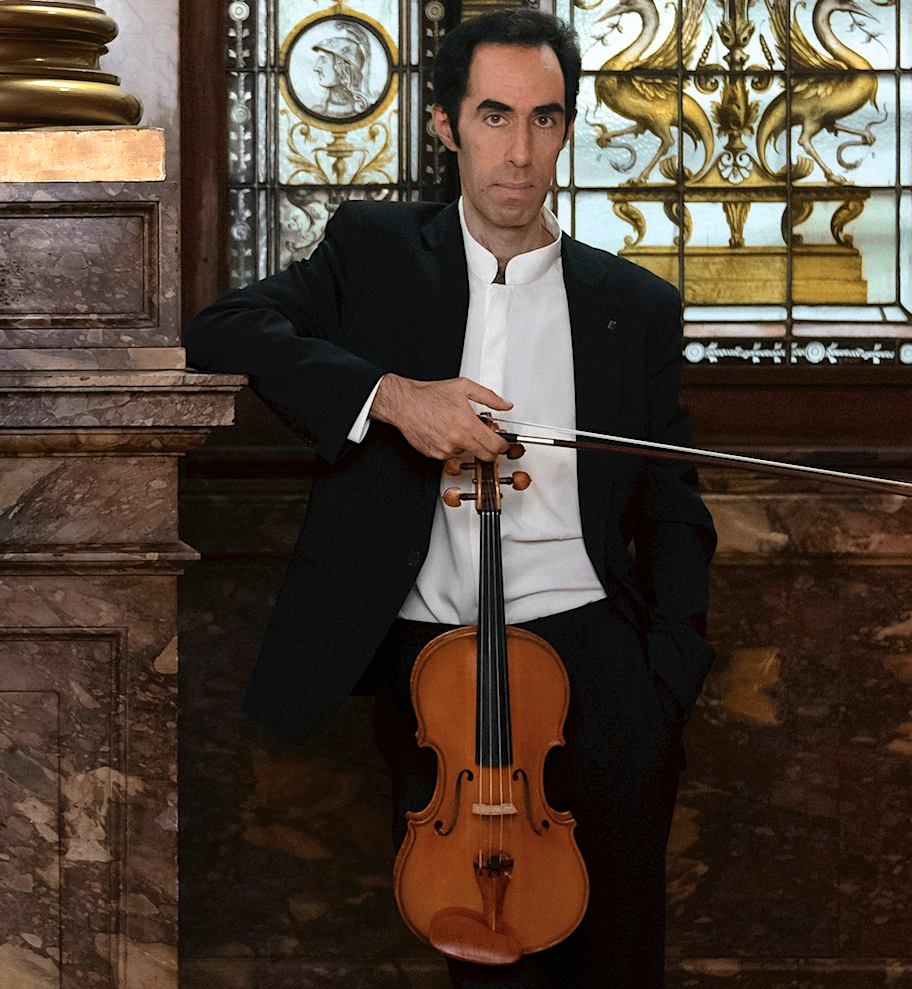
Daniel Rubenstein (Belgium)
Violist & Violinist Viola & Violin & Chamber music Professor at the Mons Royal Conservatory – Arts2 (BE) Chamber music associate professor at the Brussels Royal Conservatory (BE) Artistic Director of the Festival Mozart – International Chamber Music Festival Waterloo/Nagakute (BE/JP)
Daniel Rubenstein performed extensively as a chamber musician, in recitals or as a soloist, across Belgium, Holland, Germany, Spain, Portugal, France, Italy, Luxembourg, Ireland, Bulgaria, Romania, Brazil, Turkey, Tunisia, Israel, South Korea and Japan. 1st Prize Winner of several national music competitions, Daniel Rubenstein gave his first concert as a soloist at the age of 15 with the National Orchestra of Belgium under the direction of Mendi Rodan.
Daniel Rubenstein performed more than 200 chamber music works with nearly 100 International artists in festivals and important Concert Series, and has created more than 40 new works by renowned composers such as Hao-Fu Zhang, Jacqueline Fontyn, Don Freund, Oded Zehavi, Jean-Pierre Deleuze, Michel Lysight, Jan Freidlin, some of those work being especially written for or dedicated to him. He is also the 1st violinist for the Ensemble Mendelssohn which performs extensively in quintets and sextets, and violist of Estampes.
His discography includes 12 CD published by Dux, Talent records, Pavane, Kalidisc and Harp&Co, which received excellent critics from the International press (Gramophone, Crescendo, Fanfare, Musiweb etc.) including recitals violin-piano, viola-piano, double concertos and chamber music works.
Graduated with Honors from the Royal Brussels Conservatory (Belgium) and the Indiana University (USA) in 3 instruments (violin, viola & piano), Daniel Rubenstein is presently violin and viola as well as chamber music professor at the Royal Conservatory of Mons (Belgium), and Associate Professor in chamber music at the Royal Conservatory of Brussels where he also served as guest violin Professor. In addition, he gives regularly Masterclasses in Europe and abroad.
Daniel Rubenstein is also the Artistic director of the Festival Mozart (Belgium and Japan) and International chamber music festival which is now in its 25th year.
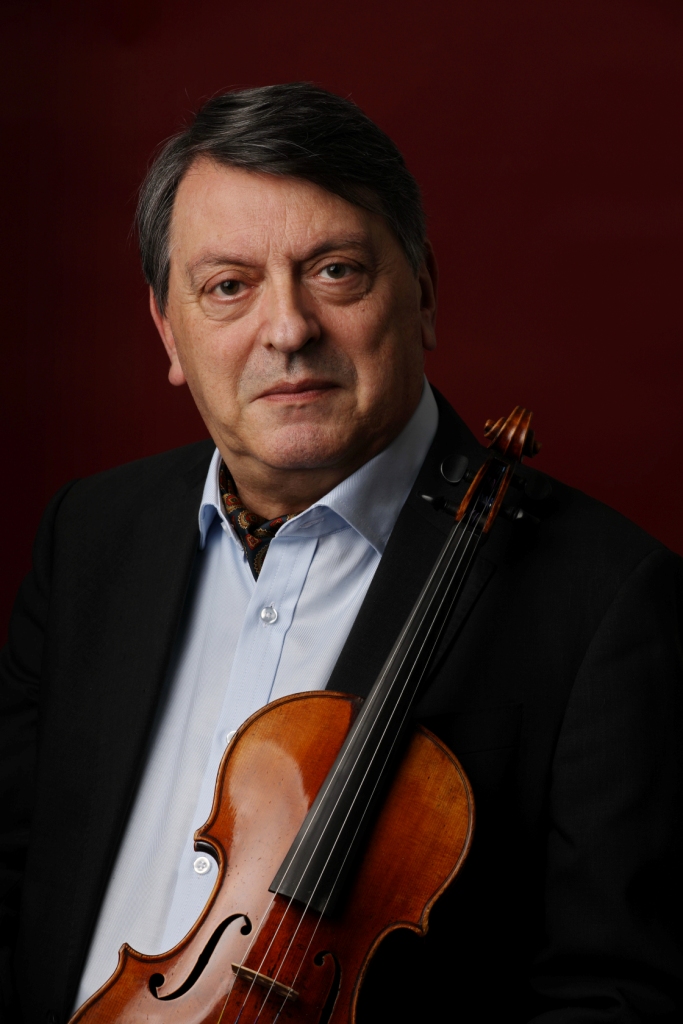
Alexis Galpérine (France)
Violinist Professor at the National Conservatory of Music in Paris, France (violin and pedagogy) Professor at the American Conservatory of Fontainebleau, France
Violinist Alexis Galpérine was born in Paris in 1955. In his nearly forty-year career he has performed as a soloist and chamber musician in most European countries, Russia, Israel, America and Japan.
He studied at the Conservatoire National Supérieur de Musique in Paris and at the Juilliard School in New York. His main teachers were Roland Charmy, Ivan Galamian and Henryk Szeryng. He is laureate of the Carl Flesch (London) competition, Paganini (Genoa) competition and First Prize at the Belgrade competition. He also holds a degree in philosophy from the Sorbonne.
He has performed as a soloist with the Orchester Lamoureux, the Monte-Carlo Philharmonic Orchestra, the Orchester Mondial des Jeunesses Musicales, the Royal Philharmonic Orchestra, the Orchester Philharmonique de Lorraine, the American Chamber Orchestra and chamber orchestras from Sofia, Belgrade, Cologne, Tuscany, Bratislava etc., under the direction of Manuel Rosenthal, Michel Tabachnick, Antoni Ros-Marba, Paul Méfano, Charles Groves, Bruno Mantovani, Marcello Viotti…
As a chamber musician, he has performed many festivals such as the Library of Congress Summer Festival in Washington DC, the Musicades de Lyon, the Nancyphonies, the Arcs, Siena, Asolo, Cremona and in the concert series of Radio-France. A founding member of the American Chamber Players, an ensemble that was ten years in residence at the Library of Congress, he has given hundreds of concerts in the United States and Canada. In France, he is a permanent guest artist of the Ensemble Stanislas.
Alexis Galpérine has created nearly a hundred works, notably with the 2e2m and Musicavanti ensembles. He is the dedicatee of Alone by Paul Méfano, Légendes of Laurent Martin (concerto for violin, with winds and choir), the concerto by Yassen Vodenitcharov, sonatas by Frédérik Martin and Roger Boutry, Adagio by Olivier Greif , Belgirate by Carlos Roqué-Alsina, Edouard Souberbielle Quartet …
The cinema called on him and he composed stage music (for Coline Serreau, Benno Besson …)
Professor at the National Conservatory of Music in Paris (violin and pedagogy) and at the American Conservatory of Fontainebleau, he sits on the juries of international competitions (president of the Ginette Neveu Competition in 2013) and gives masterclasses in France and abroad . He was notably invited to Bloomington University.
His discography currently has around sixty recordings. A number of CDs and DVDs were distinguished (“Choc” from the World of Music, “10” from Repertory, “Coup de Cœur” from the Charles Cros Academy, “Diapason d’Or”, “Disc of the Month” from Classica …)
Alexis Galpérine is the author of musicological books and articles. The Olivier Greif book, in which he participated under the direction of Brigitte François-Sappey and Jean-Michel Nectoux (Editions Aedam Musicae), won the Singer-Polignac Foundation Prize and the Critics’ Prize, best musical book of the ‘year. He is a member of the editorial board of La Revue du Conservatoire, he is now President of the French section of ESTA (European String Teachers association) and directs the violin collection of Delatour-France editions.
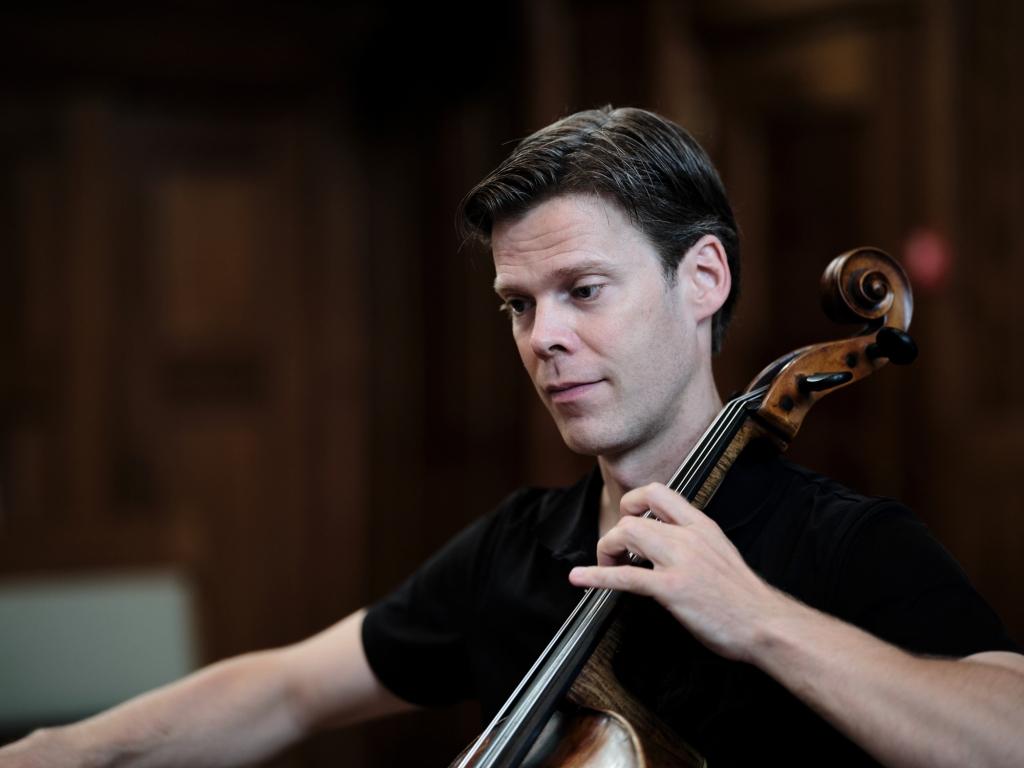
Joachim Eijlander (Netherlands)
Cellist Cello professor and Faculty Representative low strings at Codarts, Rotterdam, Netherlands Teacher at the Nederlandse Strijkkwartet Akademie of the Conservatory of Amsterdam, Netherlands
Joachim Eijlander performs as soloist and chambermusician in Europe, Asia and the United States. Joachim has performed alongside ensembles and musicians including the Borodin quartet, Lisa Larsson, Robert Holl, Solomiya Ivakhiv, Klara Wurtz, Inon Barnatan, Karl Leister and Olivier Patey.
Joachim Eijlander has collaborated with composers Henri Dutilleux, György Kurtag, Sofia Gubaidulina, Louis Andriessen and Joey Roukens.
In 2015 he recorded the cellosuites by J.S. Bach and in 2017 the caprices by A. Piatti and J. dall’Abaco on cd for the label Navis Classics. In 2020, the newest album “Dark Fire”, with music by A. Saygun, a. Tsintsadze and G. Cassadó, was published by label TRPTK. The cd’s were highly praised in the international press.
Joachim was a regular guest in the international music festivals of Sitka Alaska, El Paso Texas, Prussia Cove (GB), Schleswig-Holstein and Mecklenburg-Vorpommern (Germany). He performed in halls such as Philharmonie and Konzerthaus Berlin, Tonhalle Zürich, Concertgebouw Amsterdam, Philadelphia Chambermusic society, and in New York.
Joachim is main cello teacher at Codarts Rotterdam, representative of the cello and double bass sections at Codarts, teacher at the Dutch Stringquartet Academy Joachim has taught as a guest teacher at Indiana University, Texas University, Kansas University, Milwaukee Conservatoire, Oklahoma University, the Ljubljana Conservatoire in Slovenia and at international festivals.
Joachim was founder of the internationally acclaimed Rubens Quartet, which existed from 2000 until 2014. The quartet won many international prizes and toured extensively in Europe and the USA.
Joachim Eijlander plays on an exceptional Italian cello made in Rome in 1755 by an anonymous master.
1 Grand Prix for all groups and disciplines – 1000 euro
String instruments: 1st age group – 15-20 years
1st prize – 350 euro
2nd prize – 250 euro
3rd prize – 200 euro
String instruments: 2nd age group – 21-32 years
1st prize – 450 euro
2nd prize – 300 euro
3rd prize – 250 euro
Chamber music ensembles – 18-32 years
1st prize – 500 euro
2nd prize – 400 euro
3rd prize – 300 euro
Special prizes
The Best performance of a work by a Belgian composer
Best accompanist of the competition
Best violist of the competition
Best violinist of the competition
Best cellist of the competition
Young hope Award (attributed by association Triomphe de l’Art, asbl)
Special prizes(s) from Triomphe de l’Art, asbl : concert at the annual music festival “Triomphe de l’Art”
Special prize from Jewellery design Arena Agadzhanyan
Special prize from Rose d’Anvers (Rose with diamonds)
Masterclass from one or several members of jury
Special prizes from AZZATO shop in Brussels : vouchers to buys Azzato products
Special prizes from Peermusic Classical Europe and Chostakovich Association Paris : Books with music from the catalogue
Special prizes from Atelier de lutherie Vincent Degrande : vouchers
Pianos Maene Bruxelles,
Rue de l’Argonne 37, 1060 Brussels
Belgium
Brussels Royal Conservatory (KCB),
Rue de la Régence 30, 1000 Brussels
Belgium





